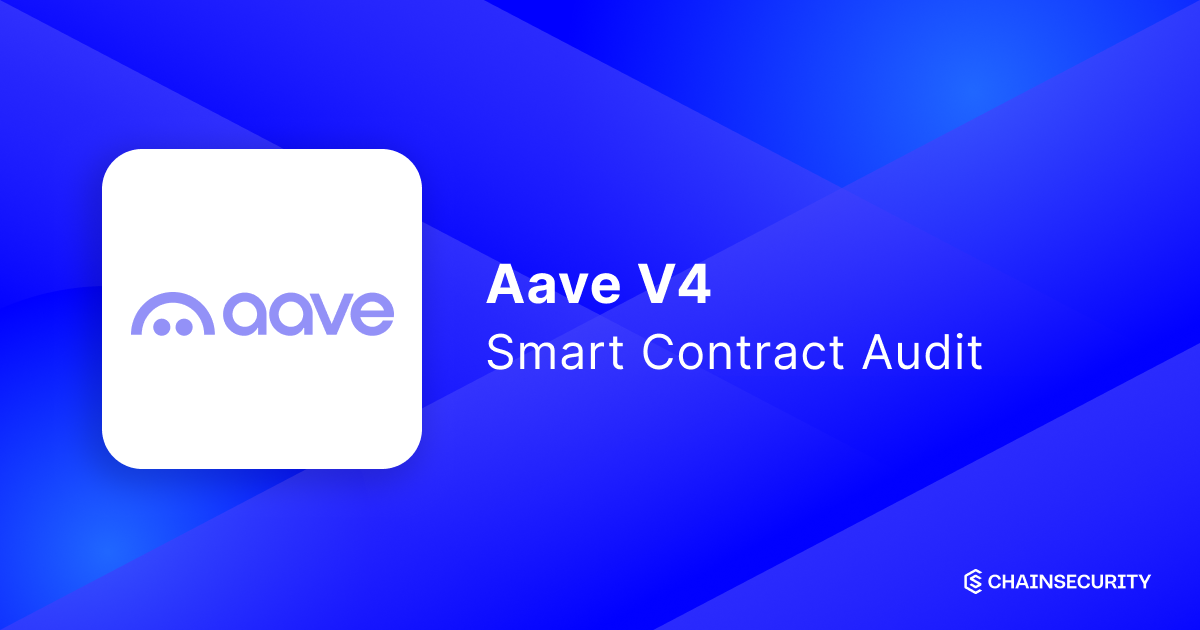
.png)
About Aave V4
Aave V4 introduces a lending protocol with a modular architecture centered around the Hub and Spoke model, designed to unify liquidity management across multiple markets while preserving isolation and configurability.
Audit Summary
The most critical subjects covered in our audit are arithmetic precision and asset solvency. Regarding arithmetic precision the invariant violation reported in Share price can decrease because of fee rounding has been satisfactorily addressed. Regarding asset solvency, issue 2 Wei rounding can trigger liquidations and create additional debt has been addressed by increasing the accounting precision of premium debt.
The general subjects covered are liquidations, functional correctness and event handling. All reported issues have been addressed.
This version of the code (v0.5.7) is still under review. Additional code and specification changes can be found in a successive version (v0.5.9), which ChainSecurity is currently reviewing.
It is important to note that security audits are time-boxed and cannot uncover all vulnerabilities. They complement but do not replace other vital measures to secure a project.
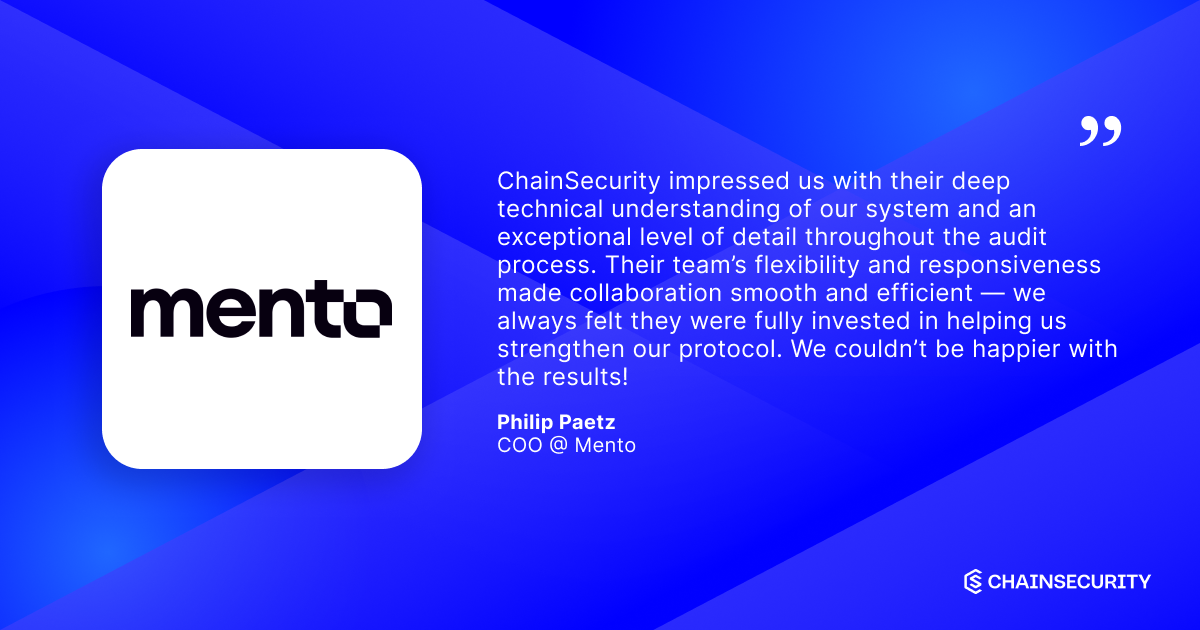

About Mento Core V3
Mento offers Mento Core v3, a collateralized debt position (CDP)-backed Foreign Exchange (FX) system. Mento Core v3 implements a Fixed Price Market Maker (FPMM) contract, which offers fixed-ratestablecoin swaps based on oracle prices. The system also includes a separately audited Liquity v2 fork, which allows users to open CDPs for different currencies by depositing USDm tokens and minting stablecoins against them. The FPMM can also use the Liquity fork's StabilityPool and redemptions for rebalancing.
Audit Summary
The most critical subjects covered in our audit are functional correctness, oracle implementation and itsoperational implications, as well as rounding issues. Functional correctness has been improved by addressing Incorrect Redemption Fee Formula in CDPLiquidityStrategy. Rounding directions do not consistently follow best practices (though no specific attack was uncovered), see Rounding Should Favor Protocol LPs. The general subjects covered are documentation and specification, observability, and correctness of preview functions. Documentation is good thanks to detailed descriptions of the Liquity fork and rebalancing flow, although practical liquidity caveats remain, see Forex Market Low-liquidity Considerations. Helper utilities such as the zap parameter generators have known limitations, see ZapParameters Helpers Ignore Price/State Changes. We have also provided Notes on important considerations which can aid in understanding the system. In summary, we find that the codebase provides a satisfactory level of security. It is important to note that security audits are time-boxed and cannot uncover all vulnerabilities. They complement but don't replace other vital measures to secure a project.


About Mento Liquity V2
Mento implements a fork of the Liquity v2 protocol, extending its functionality to enable users to open collateralized debt positions (CDPs) by depositing the USDm stablecoin and borrowing non-USD stablecoins against it. Key additions include governance-controlled SystemParams, an upgradableStability Pool that exposes liquidity to external strategies for rebalance operations, and an FX price feed.
Audit Summary
The most critical subjects covered in our audit are functional correctness, system parameters, oracles and implications of the new rebalance functionality. Functional correctness is now high after addressing Batch Manager is not deleted in kickFromBatch. Correctness regarding boundaries for system parameters has been improved after addressing minDebt Bounds Do Not Allow Configuring Low-value Currencies Correctly. Governance choosing correct values continues to be essential to ensure the security of the system. The oracle implementation is secure. However, it is intentionally not available over weekends, which can cause delays in liquidations and leads to Cannot add collateral if market closed. Finally, the new rebalance functionality as well as the permissionless oracle price relaying introduce additional risks and break assumptions of Liquity v2, such as Redistributions Are More Likely To Happen.These risks should be actively monitored. We have also provided Notes on important considerations which can aid in understanding the system. In summary, we find that the codebase provides a satisfactory level of security. It is important to note that security audits are time-boxed and cannot uncover all vulnerabilities. They complement but don't replace other vital measures to secure a project.
.png)

Summary
The most critical subjects covered in our audit are accounting correctness, reentrancy protection, and access control. Security regarding accounting correctness is high after issues such as Bridge Transfer Can Be Counted as Profit and Linked Positions Can Be Updated Separately have been addressed. Security regarding reentrancy protection is high, after issues such as Reentrancy Can Cause Incorrect Share Price and Reentrancy Can Circumvent Slippage Check have been addressed. Security regarding access control is high.
In summary, we find that the codebase provides a high level of security.
A correct configuration is critically important for the system to behave correctly. We have compiled a summary of important behaviors that risk managers should be aware of in the Notes for Risk Managers section.
It is important to note that security audits are time-boxed and cannot uncover all vulnerabilities. They complement but don't replace other vital measures to secure a project.
About Makina Core
Makina implements a cross-chain asset management protocol that defines roles that can manage the assets deposited by users. The system leverages the Weiroll VM to allow the execution of arbitrary instructions that have been pre-approved by the risk manager. Furthermore, it implements slippage checks that ensure there can be no unexpectedly large losses when executing instructions or swaps. This framework allows a flexible way to manage assets across multiple chains while ensuring that losses can be limited, even in the event of an operator secret key compromise.
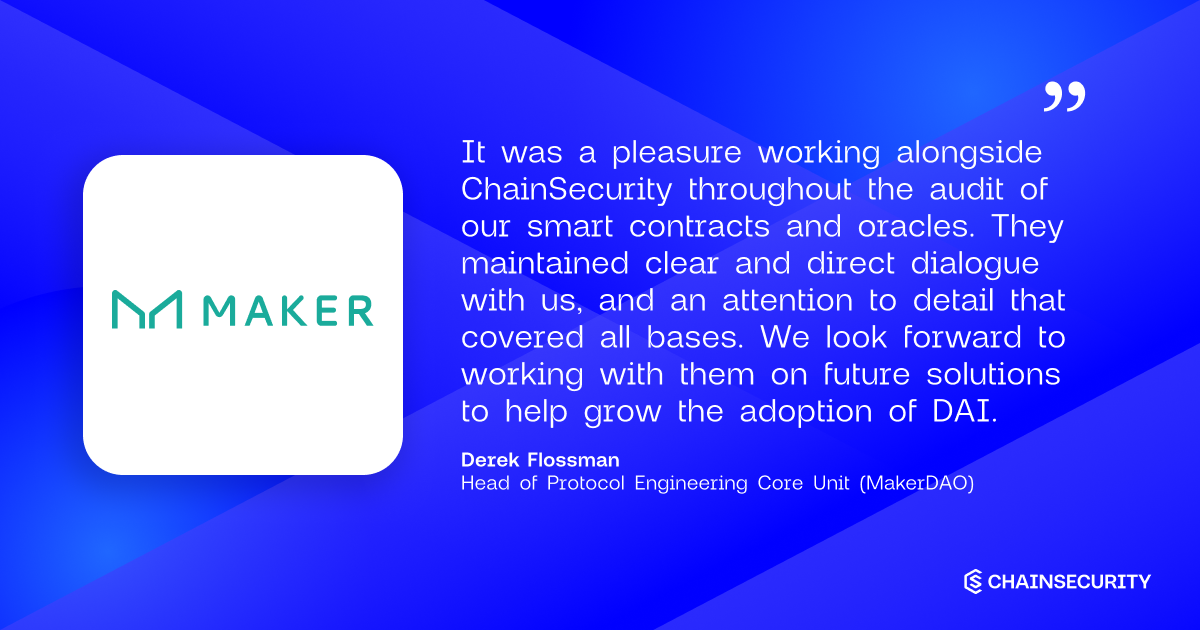

Summary
The most critical subjects covered in our audit are functional correctness, access control and frontrunning resistance. While security regarding all the aforementioned subjects is high, this reports contains some notes about the proper use of the contracts.
In a production setting, Deployment verification is strongly recommended. While Foundry does not atomically perform deployment, no frontrunning possibilities have been found. The current state of the deployment and initialization scripts shows a high level of security.
It is important to note that security audits are time-boxed and cannot uncover all vulnerabilities. They complement but don't replace other vital measures to secure a project.
In summary, we find that the codebase provides a high level of security.
It is important to note that security audits are time-boxed and cannot uncover all vulnerabilities. They complement but don't replace other vital measures to secure a project.
About Sky - Endgame Toolkit
Sky implements a toolkit for SubDAO governance including a governance token, a proxy contract for governance spell execution and a reward farming contract. This audit report reviews the security and correctness of the contracts as well as the corresponding deployment scripts.
In the latest version reviewed changes were made to update a farm's existing vest. Overall the endgame-toolkit offers a new governance token for SubDAO-level governance, a SubProxy for executing governance delegatecalls and a farming module allowing stakers to earn rewards.
.png)

Summary
The most critical subjects covered in our audit are access control, functional correctness, and fee management. Security regarding Access control is high. Security regarding functional correctness is high, after StartCooldown Allows Starting Cooldown With More Than Balance has been resolved. Security regarding fee management is high, after Watermark Does Not Consider Maximum Fee was fixed.
The general subjects covered are code complexity, upgradeability, and documentation. Security regarding all the aforementioned subjects is high.
In summary, we find that the codebase provides a high level of security.
It is important to note that security audits are time-boxed and cannot uncover all vulnerabilities. They complement but don't replace other vital measures to secure a project.
About Makina Periphery
Makina implements periphery contracts for the Makina Protocol, an on-chain asset management platform. They include a Depositor, a Redeemer with a withdrawal delay, and a Security Module.
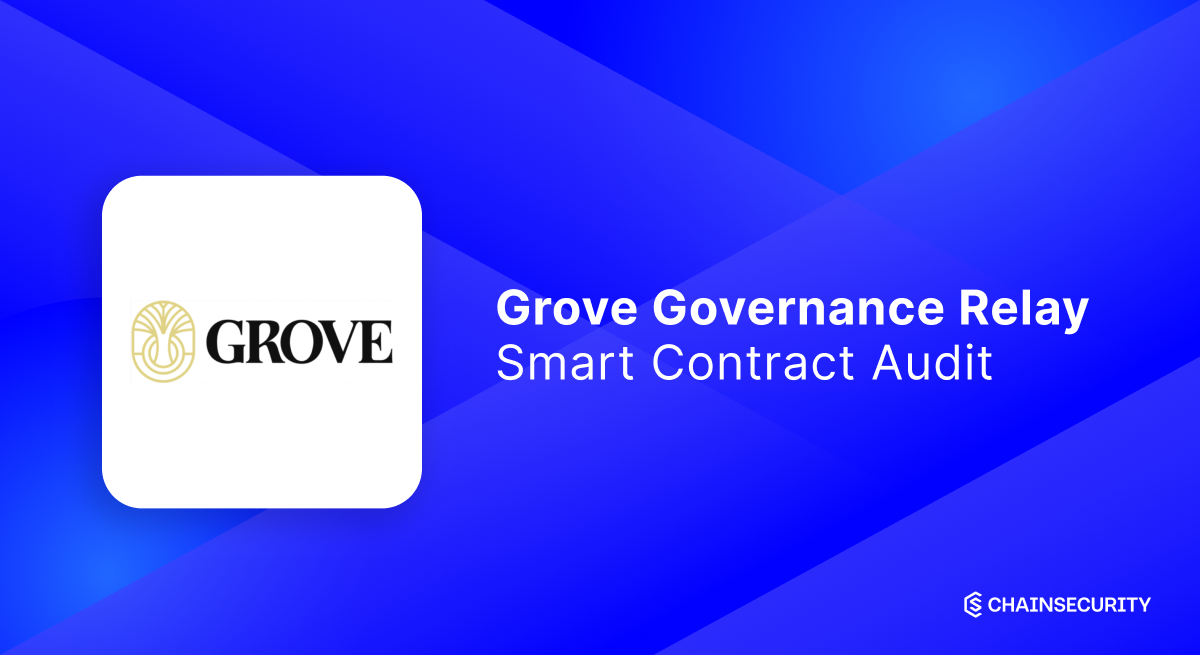

Summary
The most critical subjects covered in our audit are access control and functional correctness. The general subjects covered are unit testing, specification and trustworthiness.
Security regarding all the aforementioned subjects is high.
In summary, we find that the codebase provides a high level of security.
It is important to note that security audits are time-boxed and cannot uncover all vulnerabilities. They complement but don't replace other vital measures to secure a project.
About Grove Governance Relay
GroveLabs implements a relay for governance actions that allows for the execution of governance proposals across chains.
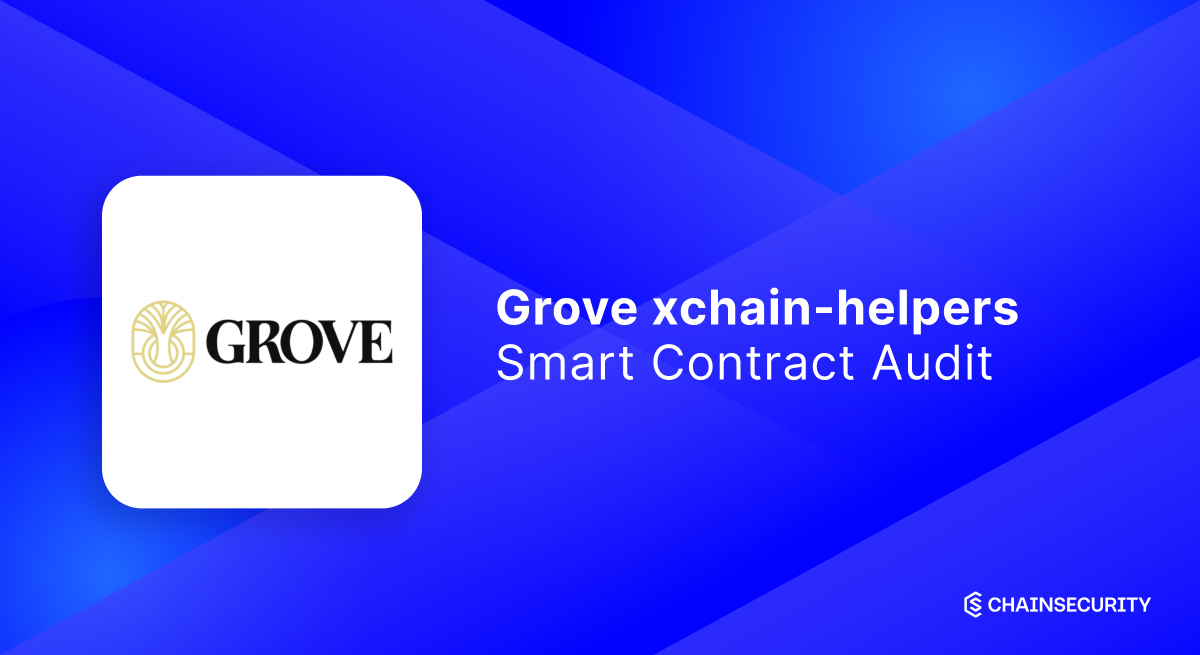

Summary
This review focused on the additions to Grove xchain-helpers compared to Spark xchain-helpers commit 913ae38, introducing support for Arbitrum chains with ERC-20 gas tokens, Circle's CCTP v2, and LayerZero V2.
The most critical subjects covered in our audit are integration with the supported bridges, access control and functional correctness. The general subjects covered are documentation and integrity. Security regarding all the aforementioned subjects is high.
In summary, we find that the codebase provides a good level of security.
It is important to note that security audits are time-boxed and cannot uncover all vulnerabilities. They complement but don't replace other vital measures to secure a project.
About Grove xchain-helpers
GroveLabs offers a library (a fork of Spark xchain-helpers) for cross-chain messaging between Ethereum Mainnet and L2s.
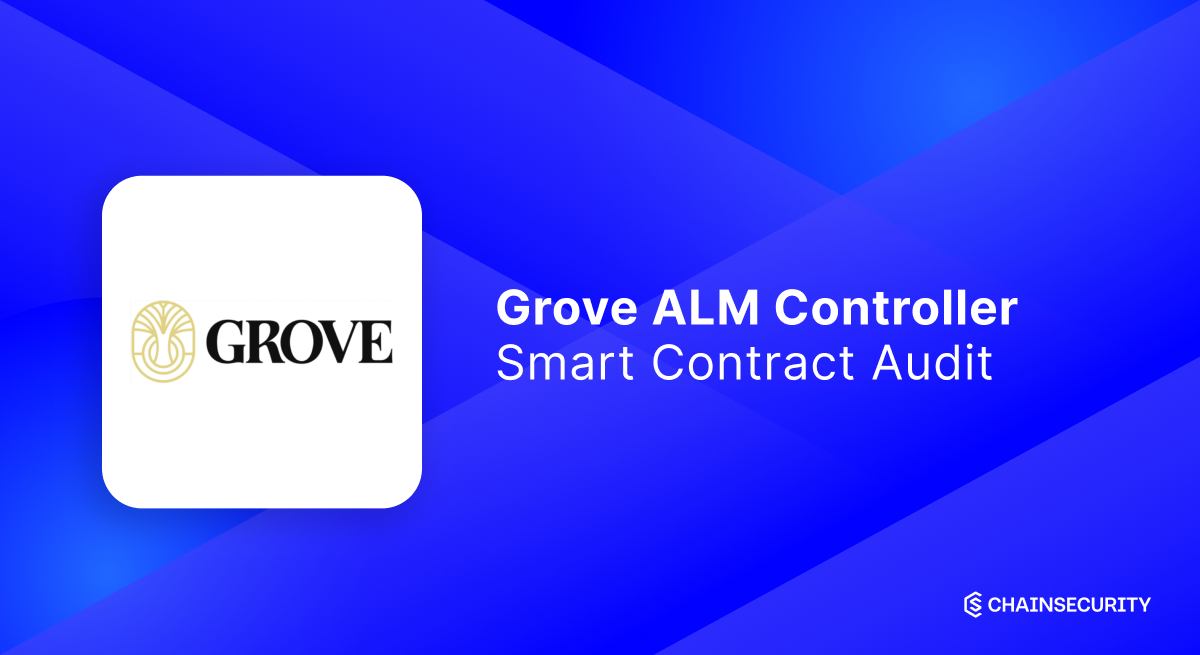

Summary
The most critical subjects covered in our audit are access control, the correct integration with the external protocols. The general subjects covered are gas efficiency, documentation and composability.
During our review, several issues were uncovered in the interaction with UniswapV3. Most importantly, the maxSlippage check on operations limiting the relayer was found to be ineffective, see Ineffective maxSlippage check in UniswapV3Lib. Further issues uncovered included Governance Tick Bounds Not Revalidated When Adding Liquidity to Existing Position and Pool/TokenId Mismatch Allows Incorrect Rate Limit Accounting in addLiquidity().
After the intermediate report all reported issues have been resolved. In summary, we find that the codebase provides a high level of security. It is important to note that security audits are time-boxed and cannot uncover all vulnerabilities. They complement but don't replace other vital measures to secure a project.
About Grove ALM Controller
GroveLabs offers Grove ALM Controller, a fork of Spark ALM Controller, that implements a set of on-chain components of the Grove Liquidity Layer designed to manage and control the flow of liquidity between Ethereum mainnet and L2s by leveraging Sky DSS Allocator. This latest review covers v1.8.0 which introduces support to interact with UniswapV3, the Merkl Distributor and usage of CCTPv2 amongst some other refactoring in existing code.
.png)

Summary
The most critical subjects covered in our audit are access control, functional correctness, and asset solvency. Security regarding all the aforementioned subjects is high.
The general subjects covered are documentation, testing, gas efficiency, and Solidity compiler version specification. Documentation and testing are satisfactory. All identified issues in the remaining areas were addressed after the intermediate report.
In summary, we find that the codebase provides a high level of security.
It is important to note that security audits are time-boxed and cannot uncover all vulnerabilities. They complement but don't replace other vital measures to secure a project.
About Block V
BLOCKv implements a migration system to convert the BLOCKv token (VEE) to the new Dual token (DUAL).
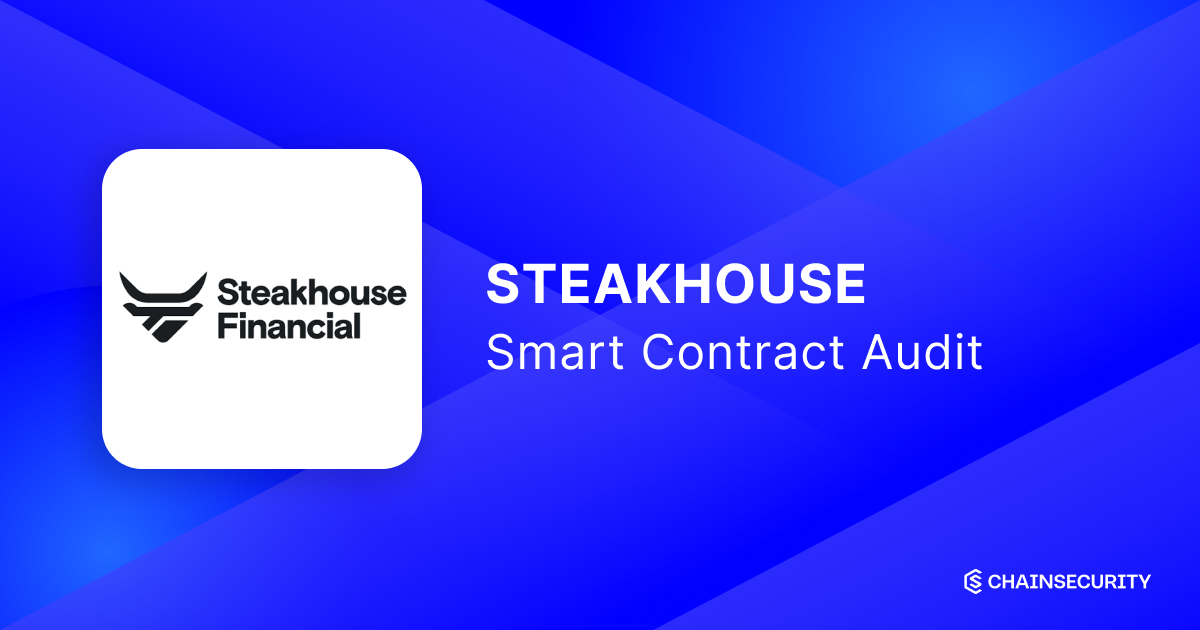

Summary
The most critical subjects covered in our audit are access control, integration with lending protocols, permissionless functions during winddown and slippage protection. We identified issues regarding insufficient input validation in the funding modules, see Funds can be locked in FundingAave during winddown and FundingMorpho.depledge() does not sanitize collateralToken. Moreover, the swapper selection by an allocator or by any user during winddown can be abused to extract value from the Box due to a lack of reentrancy protection, see Read-only reentrancy. These issues were addressed and fixed in the second version of the codebase. Security regarding all the aforementioned subjects is good.
The general subjects covered are timelock mechanics, shutdown procedure and functional correctness. Security regarding correctness is improvable, see Box cannot receive native currency. Security regarding all the remaining topics is high.
In summary, we find that the codebase provides a good level of security.
It is important to note that security audits are time-boxed and cannot uncover all vulnerabilities. They complement but don't replace other vital measures to secure a project.
About Steakhouse Box Smart Contracts
Steakhouse implements a modular vault system centered around Box, an ERC-4626 child vault that holds a base asset, invests in whitelisted ERC-20 tokens, and interacts with lending protocols through funding modules. Adapters connect Box to a parent Vault V2 by Morpho, enabling controlled deposits, withdrawals, and allocations. The system includes factories for deploying components and enforces role-based permissions and timelocks for managing operations and assets.
.png)
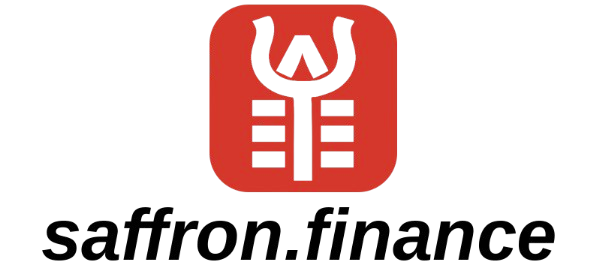
Summary
The most critical subjects covered in our audit are functional correctness, access control, and precision of arithmetic operations. Security regarding all the aforementioned subjects is high.
The general subjects covered are gas efficiency, specification, and code duplication. Security regarding all the aforementioned subjects is high.
In summary, we find that the codebase provides a high level of security.
It is important to note that security audits are time-boxed and cannot uncover all vulnerabilities. They complement but don't replace other vital measures to secure a project.
About Saffron Fixed Income Vaults
Saffron Finance implements a tailored vault contract to allow yield trading on Uniswap V3 positions. One participant provides funds to create a Uniswap position in exchange for an upfront payment, while other participants take the other side. The position is then locked and after a fixed duration, the first participant can recover the principal of the position, while the others share the yield.
.png)

Summary
The most critical subjects covered in our audit are asset flow control, correctness of the fund valuation, fee handling, and precision of arithmetic operations. Security regarding all the aforementioned subjects is high.
The general subjects covered are upgradeability, documentation, and specification. Security regarding all the aforementioned subjects is high.
In summary, we find that the codebase provides a high level of security as long as the admins follow the assumptions under Admin / owner assumptions.
It is important to note that security audits are time-boxed and cannot uncover all vulnerabilities. They complement but don't replace other vital measures to secure a project.
About Enzyme Onyx
Enzyme Foundation implements Enzyme Onyx, a set of smart contracts to tokenize on- and off-chain value. It supports customizable deposit/redeem mechanisms, fees, and debt/credit tracking.
.png)
.png)
Summary
The code is well structured and written. We carefully assessed if the protocol interactions are correct, amounts are passed correctly and there is any way to interact maliciously with the instance by e.g., using permits/approvals. We could not identify any major issues. However, because the solvers have freedom in their executions, there is no guarantee that the expected appData instructions are followed, so the interactions might need to be monitored carefully. Besides, we could not find an attack scenario for the intra-hook but this hook allows alternative execution paths for users that are not intended in normal operation.
In summary, we find that the codebase provides a high level of security. Yet, it is important to note that security audits are time-boxed and cannot uncover all vulnerabilities. They complement but don't replace other vital measures to secure a project.
About Aave CowSwap Adapters
AAVE implements convenience contracts for Aave users to perform the following actions more efficiently:
• Swap the collateral of a loan to a different asset
• Swap the debt of a loan to a different asset
• Repay a loan with posted collateral
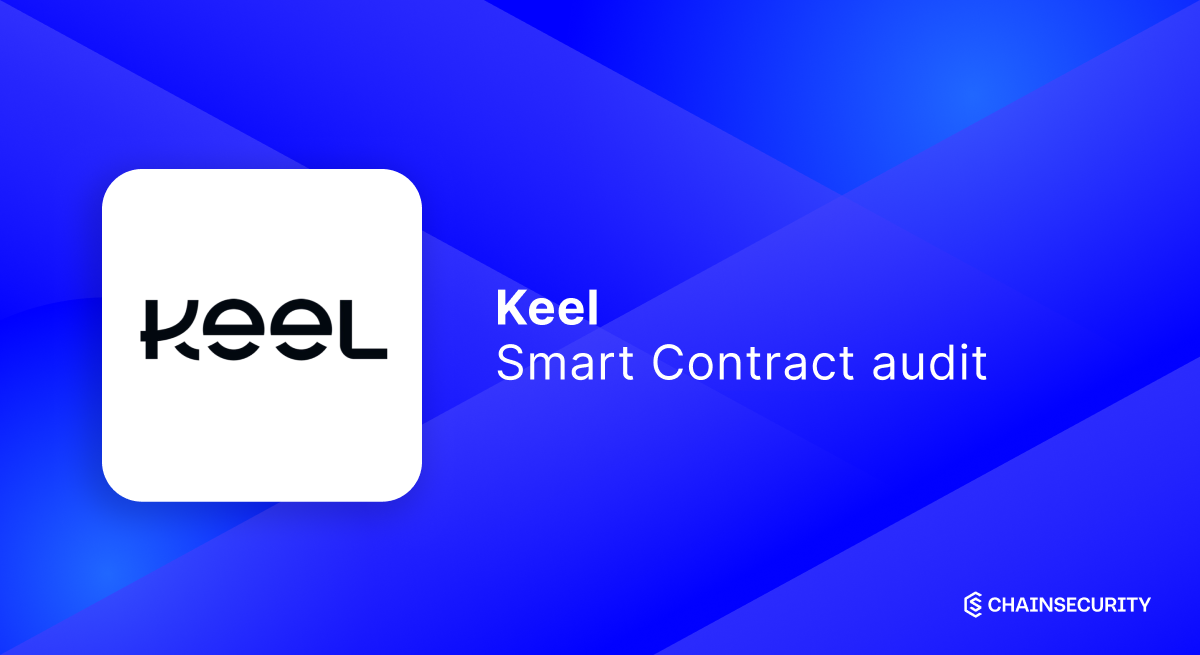

Summary
The most critical subjects covered in our audit are functional correctness, secure integration with 3rd-party protocols, and access control.
The general subjects covered are precision of arithmetic operations, front-running, and code complexity.
In summary, we find that the codebase provides a good level of security. Note active monitoring is required during the project lifetime to ensure a secure integration with 3rd-party protocols, for more considerations please refer to the Notes section.
It is important to note that security audits are time-boxed and cannot uncover all vulnerabilities. They complement but don't replace other vital measures to secure a project.
About SVM ALM Controller
Keel Finance implements SVM ALM Controller, a Solana program for the Keel capital engine designed to manage and control the flow of liquidity allocated by Sky.
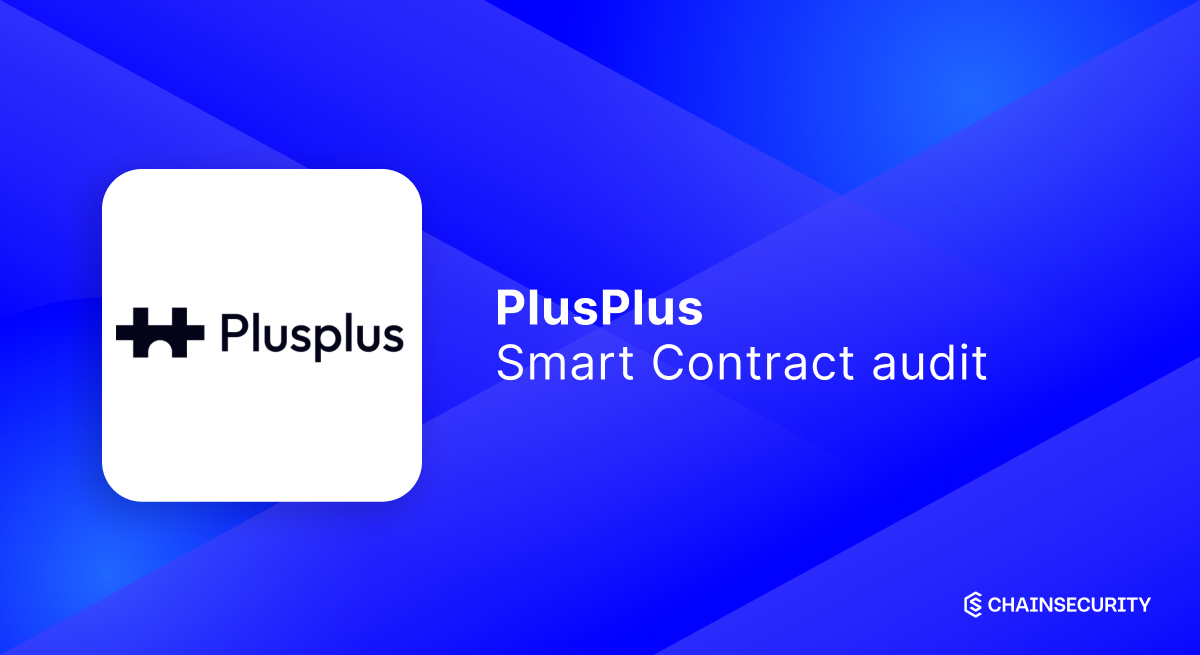

Summary
The most critical subjects covered in our audit are asset solvency, functional correctness, accounting, and access control. Security regarding asset solvency and accounting is high. There can be small accounting mismatches. However, these can be fully mitigated through off-chain processes (see Tick-accrual Mismatch on New Deposit). Functional correctness is high after Duplicate Inputs Can Overwrite Storage has been fixed. Security regarding access control is high.
In summary, we find that the codebase provides a high level of security.
It is important to note that security audits are time-boxed and cannot uncover all vulnerabilities. They complement but don't replace other vital measures to secure a project.
About Plusplus Custody
Plusplus AG implements an on-chain custody system intended to centrally hold and administer assets, with clearly split accounting per id.
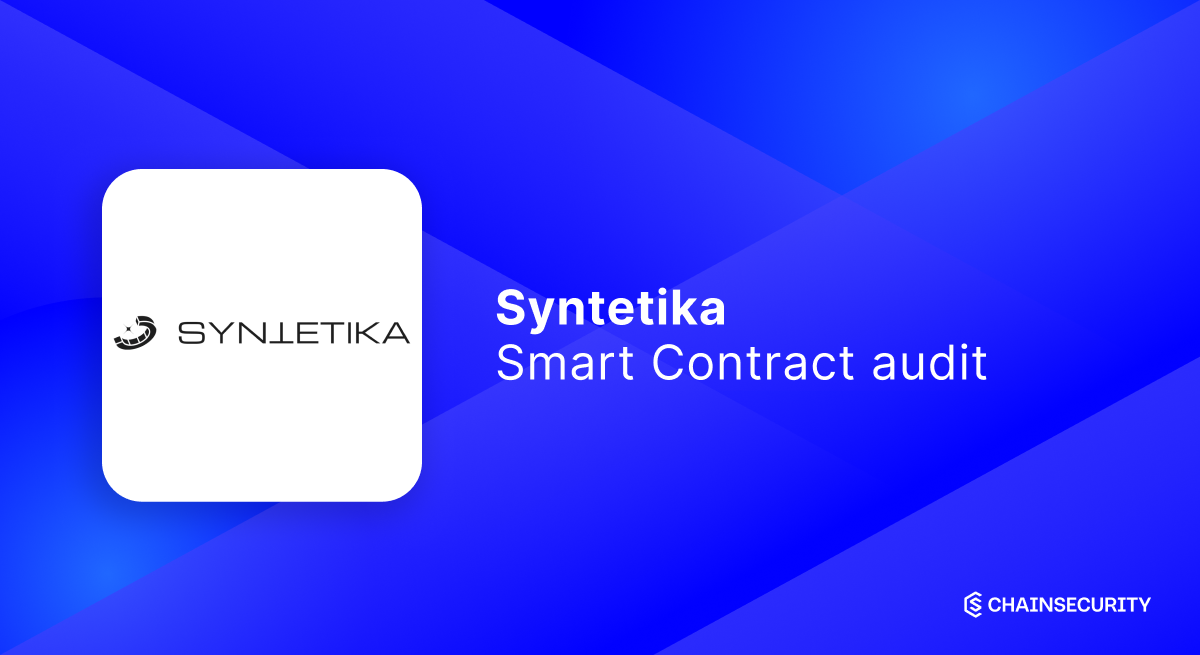

Summary
The most critical subjects covered in our audit are asset solvency, functional correctness and access control. The general subjects covered are testing, documentation, gas efficiency, and upgradeability.
Security regarding most of the above is improvable.
Further, readers are advised to carefully read the report as several findings remain where the risk was accepted. Below the most notable ones are listed:
- The loss realization process is improvable, see totalAssets() Can Revert and Loss Realization Process, Inaccurate Loss Realization and Loss Realization Can Be DoSed.
- Users can be penalized even when their cooldown window has passed, see Users Outside of Cooldown Penalized.
Additionally, the tests are insufficient as several issues could have been caught by testing more extensively.
Hence, security regarding and quality regarding the aforementioned subjects is improvable. In summary, we find that the codebase provides an improvable level of security.
It is important to note that security audits are time-boxed and cannot uncover all vulnerabilities. They complement but don't replace other vital measures to secure a project.
About Syntetika HilBTC
Syntetika implements an ERC-20 token, hBTC, that is a synthetic BTC. The custodian can use the underlying funds to generate yield which is then forwarded to hBTC stakers whose staking shares are tokenized as shBTC.
.png)

Summary
Our review focuses on the changes introduced to deploy USDD on Ethereum and BSC. ChainSecurity has previously reviewed the system which is deployed on Tron (USDDv2 and PSM).
The critical subjects covered in this review are integrations with other tokens, security of the emergency shutdown, and correctness of the deficit auction mechanism (Flopper). Security regarding all aforementioned topics is high.
The general subjects covered in this review are events handling, and documentation. Security regarding all aforementioned topics is high.
In summary, we find that the codebase provides a high level of security.
It is important to note that security audits are time-boxed and cannot uncover all vulnerabilities. They complement but don't replace other vital measures to secure a project.
About USDD on Ethereum and BSC
Decentralized USD implements USDD on Ethereum and BNB Smart Chain (BSC). USDD is a fork of the legacy MakerDAO protocol, enabling users to mint USDD, a dollar pegged stablecoin, against various collaterals.


Summary
The most critical subjects covered in our audit are functional correctness of the migration spells and migration procedure integrity. Security regarding all the aforementioned subjects is high.
The general subjects covered are code complexity, documentation, specification, and operational procedures. Security regarding all the aforementioned subjects is high.
In summary, we find that the codebase provides a high level of security.
It is important to note that the successful and secure execution of the migration depends on following the documented procedures in the README. Specifically, newly deployed contracts must be manually inspected (see Deployment Verification), parameters must be verified, results of spell 0 must be verified on both chains prior to executing spell 1, and for the token bridge migration it must be ensured that no funds are in flight before proceeding.
It is important to note that security audits are time-boxed and cannot uncover all vulnerabilities. They complement but don't replace other vital measures to secure a project.
About Sky Wormhole LayerZero Migration Library
Sky offers a library for migrating the Ethereum-Solana governance and token bridges from Wormhole stack to LayerZero V2 stack. This review covers the governance spells facilitating the migration. The underlying contracts involved in the migration have been reviewed in separate reports, as detailed in the Assessment Overview.
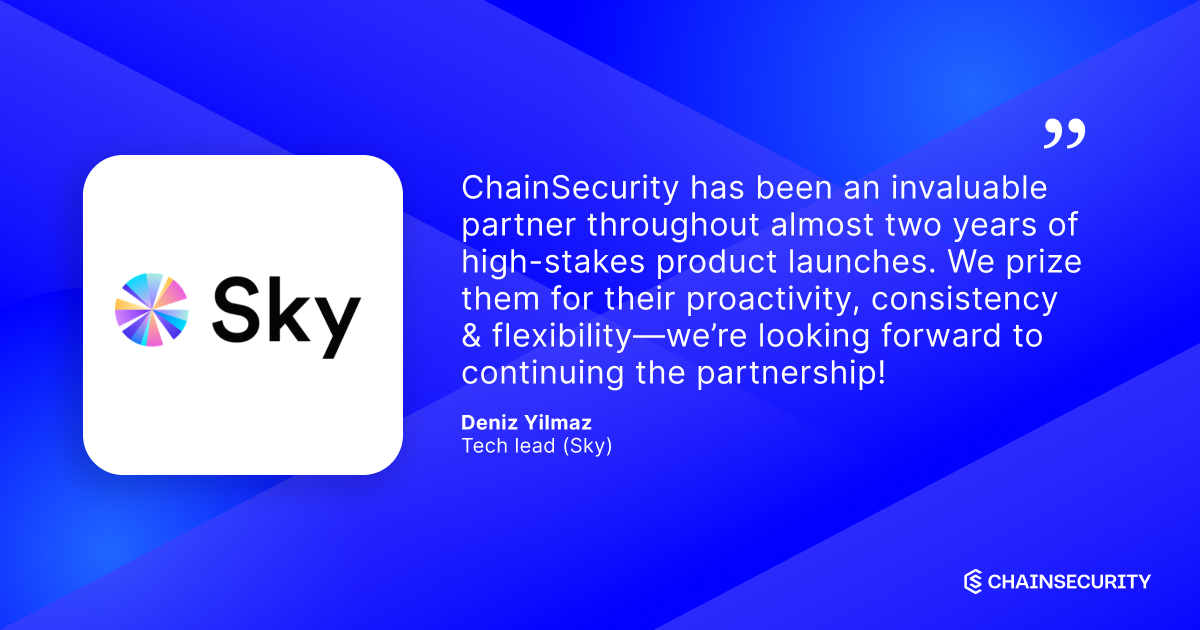

Summary
The most critical subject of this review was the correctness of the generated payloads and, thus, the correctness of the instruction generation and codec implementations. Other topics covered include the completeness of the validation.
In summary, we find that the codebase achieves the desired outcome.
It is important to note that this assessment is not a security audit but rather a review of whether the programs achieve the desired outcome. Thus, running the code in isolated environments is recommended. Last, it is important to note that reviews are time-boxed and cannot uncover all vulnerabilities. They complement but don't replace other vital measures to secure a project.
About Solana Crosschain Governance Payload Scripts
Sky implements scripts for generating payloads for the Wormhole and LayerZero governance bridge to facilitate the migration from the Wormhole infrastructure to the new LayerZero infrastructure.


Summary
The most critical subjects covered in our audit are access control, asset solvency, functional correctness, and the impact of the change on the existing system. An issue with functional correctness was identified, where Splitter.cage() did not lock the Splitter completely (see Splitter.cage() does not lock theSplitter). After the intermediate report, this issue has been resolved.
The general subjects covered are specifications correctness, optimizations, and soundness of the deployment and initialization scripts. The specification of babylonian.sqrt() was inaccurate (see Incorrect specification). The checks in the initialization scripts could be further enhanced (see Missing check for bump and Missing check of reward token on farm contract). All the issues have been resolved and security regarding all the aforementioned subjects is high.
In summary, we find that the codebase provides a high level of security.
It is important to note that security audits are time-boxed and cannot uncover all vulnerabilities. They complement but don't replace other vital measures to secure a project.
About Sky DSS Flappers
Sky has implemented new contracts to process the surplus of the stablecoin system. A new Splitter contract divides the surplus between a burning engine (Flapper) and a reward farm. Flapper contracts interact with UniswapV2, exchanging USDS for Gem tokens, with two variants:FlapperUniV2SwapOnly fully converts USDS to Gem, while FlapperUniV2 adds liquidity to the pool.


Summary
The most critical subjects covered in our audit are access control, completeness of removed functionality and suitability for the described migration process. The general subjects covered are upgradeability and documentation. Security regarding all the aforementioned subjects is high.
In summary, we find that the changes introduced provide a high level of security. However, note that the security heavily relies on the non-audited code, too.
It is important to note that security audits are time-boxed and cannot uncover all vulnerabilities. They complement but don't replace other vital measures to secure a project.
About Sky Wormhole NTT Migration Update
Sky implements an upgrade for the USDS Wormhole bridge for Ethereum and Solana. The upgrade disables the initiation of transfers to allow for an eventual migration of the token bridge to the new LayerZero infrastructure.


Summary
The most critical subjects covered in our audit are access control and functional correctness. Security regarding all the aforementioned subjects is high.
The general subjects covered include documentation and usage considerations. No documentation was provided describing the design or intended use. The report contains two notes and one informational finding related to defense in depth.
In summary, we find that the codebase provides a high level of security.
It is important to note that security audits are time-boxed and cannot uncover all vulnerabilities. They complement but don't replace other vital measures to secure a project.
About Sky LZ Governance Relay
Sky implements governance relay contracts leveraging the sky-oapp-governance bridge to relay governance calls from L1 to L2s.


Summary
The most critical subjects covered in our audit are functional correctness, access control, and compatibility with Sky governance. After the intermediate report, Arbitrary Call in lzReceive has been resolved and security regarding all the aforementioned subjects is now considered high.
The general subjects covered are gas efficiency and documentation. Documentation can be enriched. Further, some general considerations are provided for secure integration with LayerZero V2, in particular:
• LayerZero V2 Considerations
• Message Passing Considerations
• OApp Call Validation
In summary, we find that the codebase provides a good level of security.
It is important to note that security audits are time-boxed and cannot uncover all vulnerabilities. They complement but don't replace other vital measures to secure a project.
About Sky Governance OApp
Sky implements a Governance OApp using the LayerZero V2 stack to facilitate the relaying of messages in a standardized manner for EVM chains and Solana.


Summary
The most critical subjects covered in our audit are functional correctness, correct integration with LayerZero, Denial-of-Service resilience. The general subjects covered are gas efficiency and trustworthiness.
Notably this token bridge has different security assumptions than the existing native bridges since it relies on the DVN network as oracle and features shared escrowing of funds for different chains. Some general considerations regarding this are provided, in particular:
• Denial of Service.
• Migration Considerations.
• Configuration Considerations.
• Configuration Ordering Considerations.
• LayerZero V2 Considerations.
In summary, we find that the codebase provides a high level of security.
It is important to note that security audits are time-boxed and cannot uncover all vulnerabilities. They complement but don't replace other vital measures to secure a project.
About Sky OApp OFT
Sky implements an OFT (Omnichain Fungible Token) adapter for the tokens of the Sky Ecosystem (SKY,USDS, SUSDS and SDAO tokens) using the LayerZero V2 stack to bridge tokens across chains in a standardized manner. Currently, implementations for EVM chains as well as Solana are provided.
.png)

Summary
The most critical subjects covered in our audit are asset solvency, functional correctness, integration with the external protocol, and access control. The general subjects covered are testing, gas efficiency, and trustworthiness. Security regarding the aforementioned subjects is good.
The most notable, now resolved, findings are:
• Share Price Manipulation by Triggering Hooks which illustrates how access control could have been bypassed. Additionally, the finding had implications on asset solvency.
•Incorrect Reference ID which highlighted the potential for improving functional correctness. Additionally, it illustrated how testing can be improved by mirroring the expected behavior of the external protocol more accurately.
In summary, we find that the codebase provides a good level of security.
It is important to note that security audits are time-boxed and cannot uncover all vulnerabilities. They complement but don't replace other vital measures to secure a project.
About Sulu Extension XXVI
Enzyme Foundation implements an external position for integrating with Alice v2 which allows for placing orders that can be taken by Alice v2 protocol.
.png)

Summary
The most critical subjects covered in our audit are integration with the supported bridges, access control and functional correctness. The general subjects covered are unit testing, documentation and trustworthiness. Security regarding all the aforementioned subjects is high.
In summary, we find that the codebase provides a good level of security.
It is important to note that security audits are time-boxed and cannot uncover all vulnerabilities. They complement but don't replace other vital measures to secure a project.
About Spark xchain-helpers
SparkDAO implements a library for cross-chain message passing along with contracts able to receive cross-chain messages.
"Spark is on a mission to empower the DAI ecosystem. As part of the MakerDAO community, Spark builds and manages DeFi infrastructure."
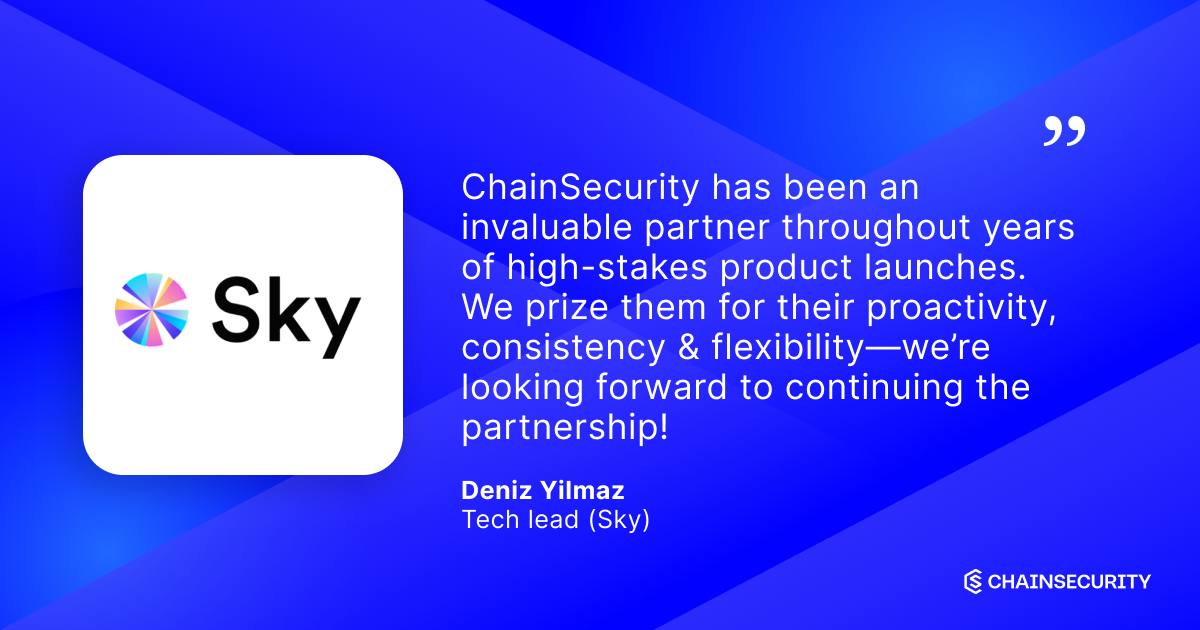

Summary
Individual spells built using this framework must be reviewed separately; the usage and combinations of DssExecLib functions and the parameter selection when calling these functions are out of scope for this review.
The most critical subjects covered in our audit are functional correctness, NatSpec documentation and operational usability. Several observations are highlighted as notes or informational issues in this report.
The general subjects covered are code quality, documentation, maintainability, and correctness of existing functionality. Note that we reviewed library completeness at a high level only, focusing primarily on verifying that existing functions work correctly. For detailed considerations regarding completeness, see Completeness of Functionality.
In summary, we find that the codebase provides a high level of security.
It is important to note that security audits are time-boxed and cannot uncover all vulnerabilities. They complement but don't replace other vital measures to secure a project.
About Sky DSS Exec Lib
Sky offers DSS Exec Lib, a structured framework for executing governance spells in the Sky Protocol. The library standardizes how spells are defined, deployed and executed while providing a set of functions for managing system parameters, collateral and governance.
.png)

Summary
The most critical subjects covered in our audit are functional correctness, asset security, and implementation integrity. Security regarding all the aforementioned subjects is high, however there are some informational issues and notes to consider in the report, for example Asset Solvency or Circular Reinvesting.
The general subjects covered are operational considerations, code complexity and documentation. ERC-4626 preview functions may revert during low liquidity conditions, which follows standard interpretation but requires integrator awareness, see ERC-4626 Preview Functions Liquidity Check.
In summary, we find that the codebase provides a high level of security.
It is important to note that security audits are time-boxed and cannot uncover all vulnerabilities. They complement but don't replace other vital measures to secure a project.
About Spark Vaults V2
SparkDAO implements SparkVault V2, a tokenized vault (ERC-4626) where interest is distributed based on a manually set Vault Savings Rate (VSR). Whitelisted takers, intended to be the Spark ALM Controller, can draw on the vault’s funds to invest.
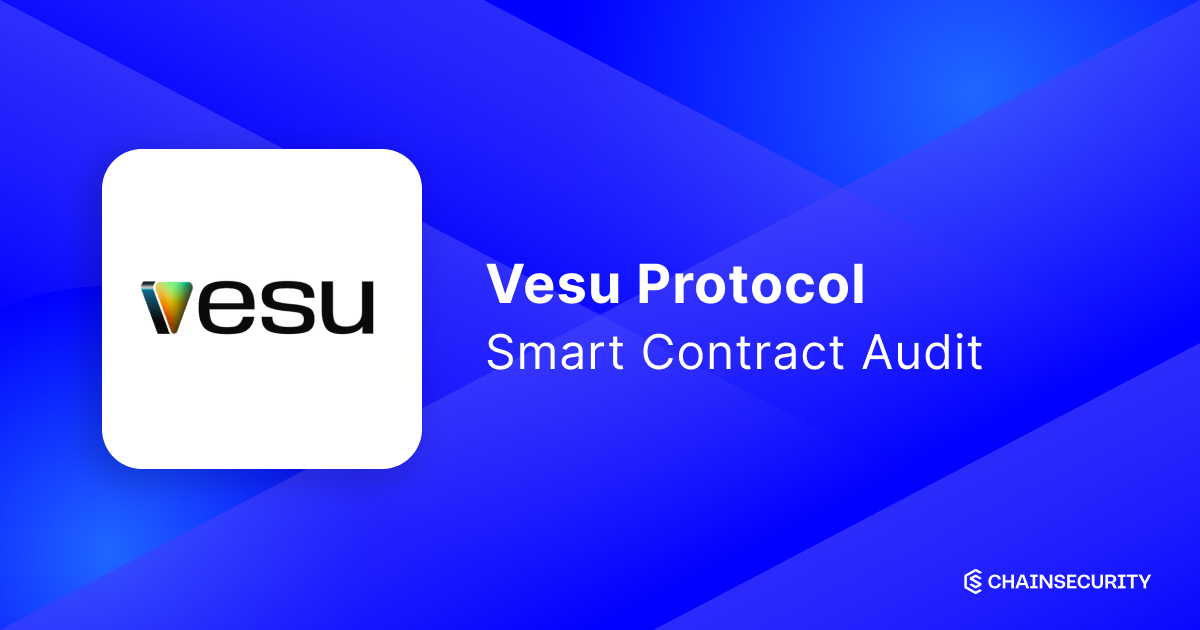

Summary
VESU implemented Vesu V2 focusing on simplifications of the original Vesu V1 design. Separate pools are deployed by the factory instead of the singleton architecture used in V1.
The most critical subjects covered in our audit are functional correctness and asset solvency. One low severity issue highlighting the effect of rounding in partial liquidations with bad debt has been reported, see Bad debt rounding can be exploited to pay off less debt. All the uncovered issues have been properly addressed.
The general subjects covered are usability, code quality and potential risks. In summary, we find that the codebase provides a high level of security.
It is important to note that security audits are time-boxed and cannot uncover all vulnerabilities. They complement but don't replace other vital measures to secure a project.
About Vesu v2
VESU implemented Vesu V2 focusing on simplifications of the original Vesu V1 design. Separate poolsare deployed by the factory instead of the singleton architecture used in V1.
.png)

Summary
The most critical subjects covered in our audit are adherence to the original codebase, access control, and correctness of the new features. In the latest reviewed version, all issues have been resolved and security regarding all the aforementioned subjects is high.
The general subjects covered are upgradeability and secure integration with oracles. After the redesign of WBTCPriceFeed, security regarding all the aforementioned subjects is high.
In summary, we find that the codebase provides a high level of security.
It is important to note that security audits are time-boxed and cannot uncover all vulnerabilities. They complement but don't replace other vital measures to secure a project.
About Uncap Finance
Uncap Finance implements a BTC backed stablecoin on Starknet. It forks the Liquity v2 stablecoin mechanism, re-implementing it in the Cairo language.


Summary
The most critical subjects covered in our audit are functional correctness, access control and integration with other contracts of the system. The general subjects covered are specification, complexity and unit testing. For the Lockstake implementation, Security regarding all the aforementioned subjects is high.
Before the Governance initializes the Lockstake instance the deployed contracts must be validated carefully. Please refer to note Deployment verification for more details.
It is important to note that security audits are time-boxed and cannot uncover all vulnerabilities. They complement but don't replace other vital measures to secure a project.
About Lockstake Smart Contracts
Sky implements a staking framework that allows borrowing against governance tokens as collateral while retaining the ability to delegate their voting power and simultaneously allowing these tokens to be staked to earn yield.
“The Sky Protocol (formely known as MakerDAO) is one of the largest dapps on the Ethereum blockchain. Designed by a disparate group of contributors, including developers within the MakerFoundation, its outside partners, and other persons and entities, it is the first decentralized finance (DeFi) application to see significant adoption.”
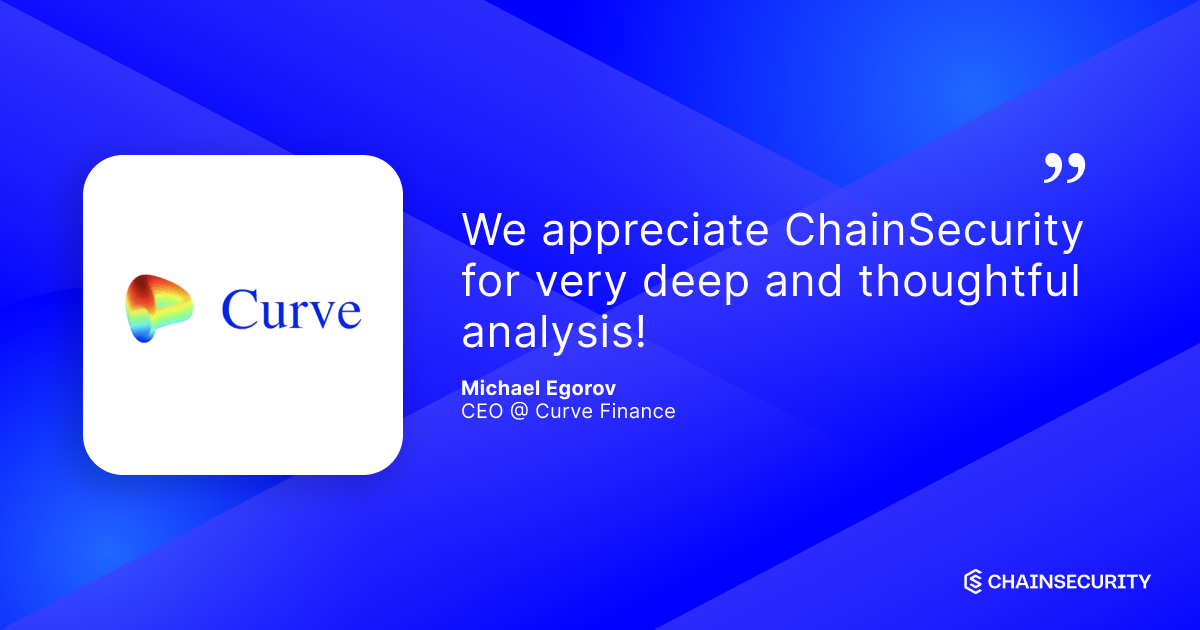

Summary
The most critical subjects covered in our audit are the Merkle Patricia Proof verifier correctness, access control, and cross-chain message decoding. Security regarding all the aforementioned subjects is high.
Other general subjects covered are denial of service, gas optimization, and RLP decoding. Security regarding all the aforementioned subjects is high.
In summary, we find that the codebase provides a high level of security.
It is important to note that security audits are time-boxed and cannot uncover all vulnerabilities. They complement but don't replace other vital measures to secure a project.
About Xgov Smart Contracts
Curve implements xGov, a system that extends the capabilities of the Curve DAO, allowing it to interact with contracts on different networks.


Summary
The most critical subjects covered in our audit are fault proof risks assessment, integration with LayerZero and the native bridges, and functional correctness. Security regarding all the aforementioned subjects is high, we highlight the risk associated with the fast bridge in the informational issue Risk linked to the fast bridge.
The general subjects covered are integration with the existing Curve infrastructure, gas efficiency, and limit enforcement. Security regarding all the aforementioned subjects is high.
In summary, we find that the codebase provides a high level of security.
It is important to note that security audits are time-boxed and cannot uncover all vulnerabilities. They complement but don't replace other vital measures to secure a project.
About Curve Fast Bridge
Curve implements Fast Bridge service leveraging LayerZero to allow users to quickly bridge crvUSD from Optimism or Arbitrum to Ethereum, without having to wait for the standard fault proof period.
.png)

Summary
The most critical subjects covered in our audit are asset solvency, functional correctness, and precision of arithmetic operations. Asset solvency has been improved after the issues Assets Can Be Double Counted and Unallocated Vault Adapter Can Report Assets were fixed. Given our Trust Model, security regarding all the aforementioned topics is good.
In summary, we find that the codebase provides a good level of security.
It is important to note that security audits are time-boxed and cannot uncover all vulnerabilities. They complement but don't replace other vital measures to secure a project.
About Morpho Vault V2
Morpho Labs implements the second version of Morpho curated vaults. The vaults are ERC-4626 compliant and non-custodial thanks to timelocks and to the "in-kind redemption" mechanism. They allow for simultaneous investments into several protocols and markets. The design of the role system allows for reasonable resilience against corrupt administrators.
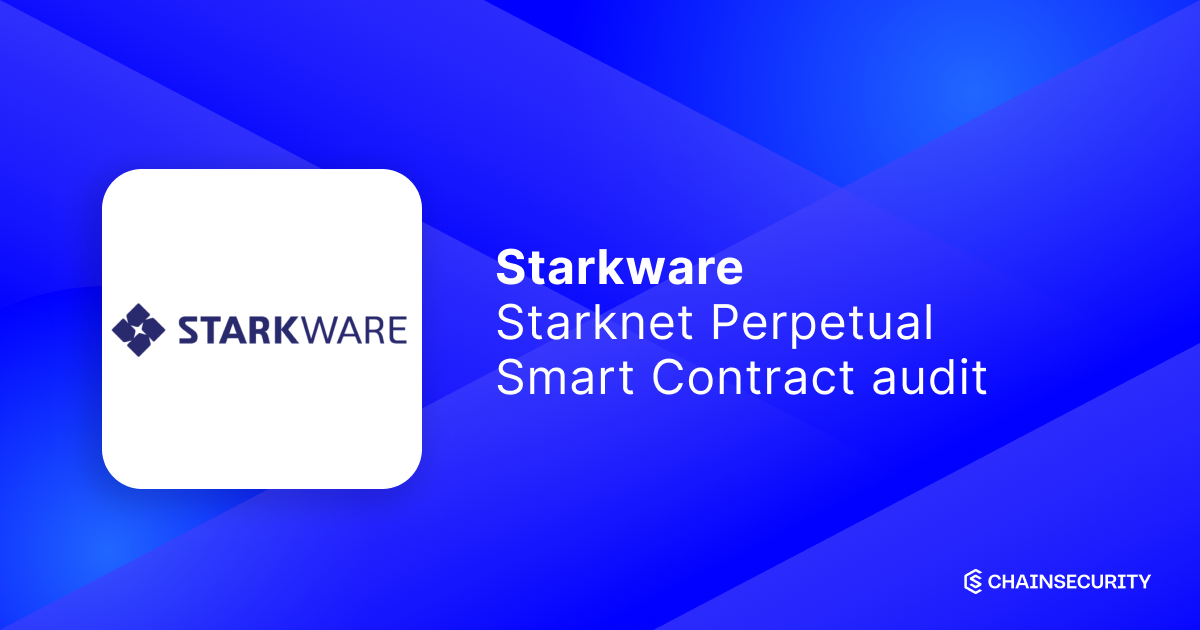

Summary
The most critical subjects covered in our audit are functional correctness, access control, signature handling, and precision of arithmetic operations. Security regarding functional correctness is good but improvable, see Insurance Fund Cannot Always Be the Deleverager. Security regarding access control and signature handling is high. Security regarding arithmetic rounding has been improved after the intermediate report, see Rounding Is Not Always in Favor of the System.
The general subjects covered are upgradeability and trustworthiness. Security regarding upgradeability is high. The operator could tweak the operations to some extent, thus affecting the trustworthiness, see Loosely Restricted Liquidations and Signed Price May Be Submitted Multiple Times.
In summary, we find that the codebase provides a good level of security.
It is important to note that security audits are time-boxed and cannot uncover all vulnerabilities. They complement but don't replace other vital measures to secure a project.
About Starkware Starknet Perpetual
StarkWare implements Starknet Perpetual contract that enables synthetic trading. It allows users to trade synthetic assets without the need for actual ownership of the underlying assets, providing flexibility and efficiency in trading operations.
.png)

Summary
The most critical subjects covered in our audit are functional correctness, access control, and the integration with CCTP. The general subjects covered are gas efficiency, documentation and composability. Security regarding all the aforementioned subjects is high.
In summary, we find that the codebase provides a high level of security.
It is important to note that security audits are time-boxed and cannot uncover all vulnerabilities. They complement but don't replace other vital measures to secure a project.
About Spark ALM Controller
SparkDAO implements the Spark ALM Controller, a suite of contracts of the Spark Liquidity Layer designed to manage and control the flow of liquidity originating from DSS Allocator.
"Spark is on a mission to empower the DAI ecosystem. As part of the MakerDAO community, Spark builds and manages DeFi infrastructure."
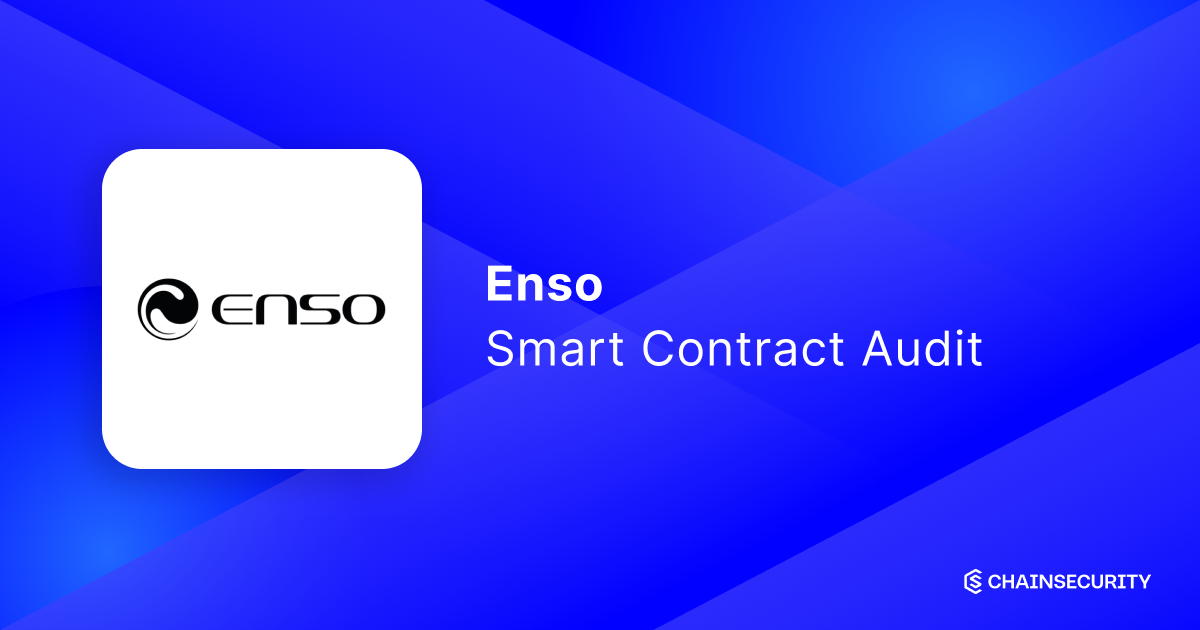

Summary
The most critical subjects covered in our audit are functional correctness, correct integration with LayerZero, and the security of funds. The general subjects covered are gas efficiency and operational considerations.
The most significant issues uncovered include:
- Ineffective griefing protection, demonstrated how the griefing protection was bypassable under certain conditions.
- Risky sweep mechanism, highlighted the risk that swept fund could be moved without preventing the corresponding message from later being executed.
Both above mentioned issues were resolved accordingly.
In summary, we find that the codebase provides a satisfactory level of security.
It is important to note that security audits are time-boxed and cannot uncover all vulnerabilities. They complement but don't replace other vital measures to secure a project.
About Enso LayerZeroReceiver
Enso implements a LayerZero v2 compose receiver that allows users to execute Shortcuts through OFT bridging.


Summary
The most critical subjects covered in our audit are access control, functional correctness and the implications for governance operations. The general subjects covered are unit testing, documentation and trustworthiness. Security regarding all the aforementioned subjects is high.
Note that only low severity and informational issues were raised.
In summary, we find that the codebase provides a high level of security.
It is important to note that security audits are time-boxed and cannot uncover all vulnerabilities. They complement but don't replace other vital measures to secure a project.
About Sky Star Guard
Sky implements Star Guard, a module enabling permissionless execution of Star Spells after they were whitelisted by a core spell.


Summary
The most critical subjects covered in our audit are integration with the supported bridges, access control and functional correctness.
The general subjects covered are documentation and integrity.
Security regarding all the aforementioned subjects is high.
In summary, we find that the codebase provides a good level of security.
It is important to note that security audits are time-boxed and cannot uncover all vulnerabilities. They complement but don't replace other vital measures to secure a project.
About Grove xchain-helpers
GroveLabs offers a library (a fork of Spark xchain-helpers) for cross-chain messaging between Ethereum Mainnet and L2s.
This review focused on the first version of Grove xchain-helpers where ArbitrumERC20Forwarder is newly introduced. Other parts of the system are covered by the Spark xchain-helpers Review.
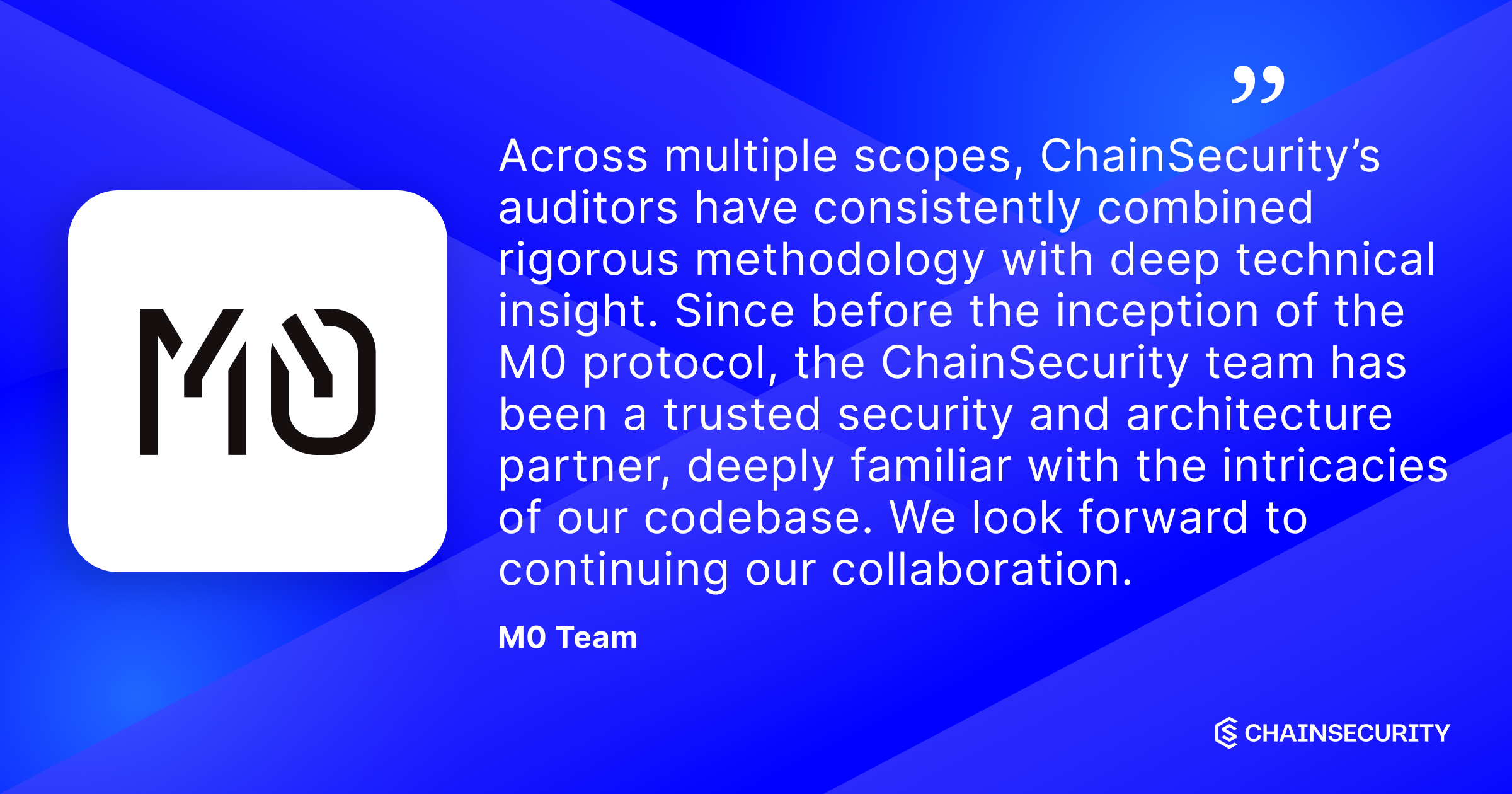
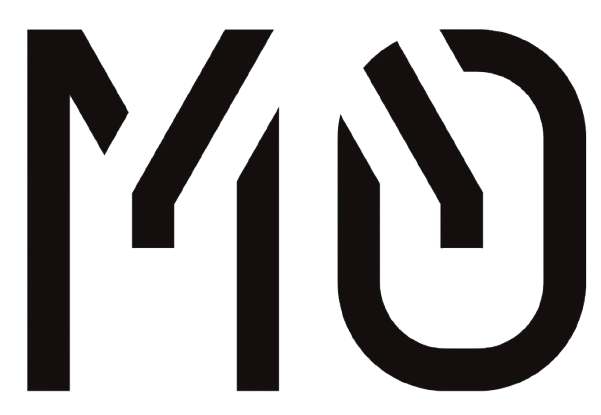
Summary
The most critical subjects covered in our audit are asset solvency, functional correctness, and precision of arithmetic operations. Security regarding all the aforementioned subjects is high.
The general subjects covered are documentation, gas efficiency, and the integration of the wrapper into the existing system. Security regarding all the aforementioned subjects is generally good.
In summary, we find that the codebase provides a high level of security.
It is important to note that security audits are time-boxed and cannot uncover all vulnerabilities. They complement but don't replace other vital measures to secure a project.
About M0 MUSD
M0 implements MUSD, an extension of MYieldToOne with pausable and forced transfers capabilities.
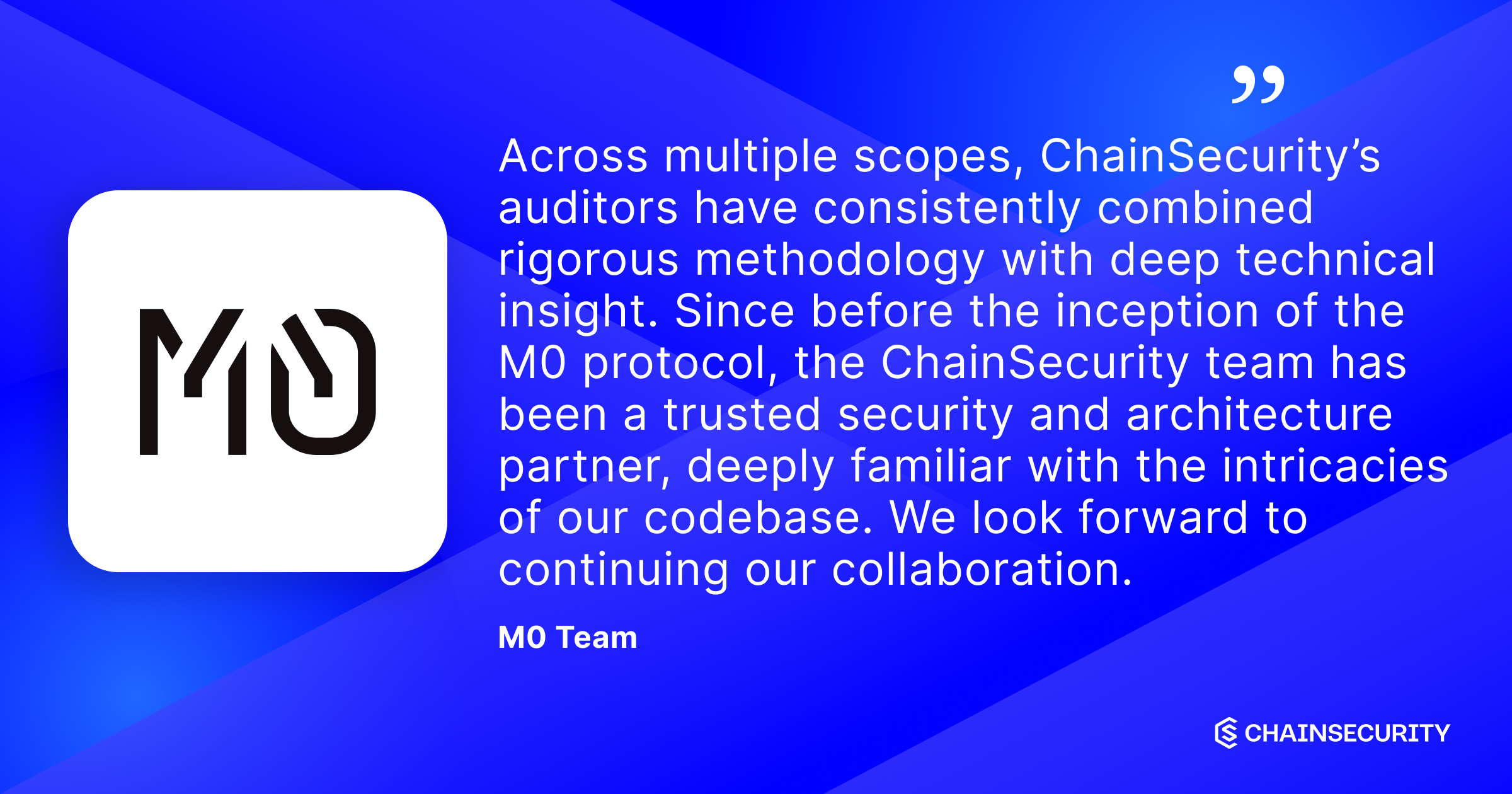

Summary
The most critical subjects covered in our audit are asset solvency, functional correctness, and precision of arithmetic operations. Security regarding all the aforementioned subjects is high, after all outstanding issues have been addressed.
The general subjects covered are documentation, gas efficiency, and the integration of the wrapper into the existing system. Security regarding all the aforementioned subjects is generally good.
In summary, we find that the codebase provides a high level of security.
It is important to note that security audits are time-boxed and cannot uncover all vulnerabilities. They complement but don't replace other vital measures to secure a project.
About M0 M Extensions Smart Contracts
M0 Labs implements a suite of different ERC-20 stablecoin contracts designed to wrap the existing $M token into non-rebasing tokens, for better composability in the broader DeFi ecosystem. These contracts, called extensions, differ in how they treat and redistribute the yield generated by their $M balance. Additionally, M0 Labs offers a SwapFacility contract, that will act as a gateway towards these extensions, being the only privileged address allowed to wrap and unwrap $M tokens.
.png)

Summary
The most critical subjects covered in our audit are functional correctness, asset solvency, and Enzyme's integration with the external system. The integration problems Claimable collateral can be overestimated and Valuation Inconsistencies have been addressed and resolved accordingly.
In summary, we find that the codebase provides a high level of security.
It is important to note that security audits are time-boxed and cannot uncover all vulnerabilities. They complement but don't replace other vital measures to secure a project.
About Sulu Extension XXV
Enzyme Foundation updates the GMXv2 external position to support the upcoming update from v2.1 to v2.2. The main changes are the addition of a new hook entry point and a change in how positions are priced.
.png)
.png)
Summary
The scope of this audit is to review the functional equivalence of ATokenVault and ImmutableATokenVault. Hence, any issues that would have been missed in the previous audit of ATokenVault are out of scope for this audit.
The two contracts differ in the construction and initialization of the vault. Hence, the functional equivalence means that two vaults which have been fully initialized with the same parameters behave identically afterwards. Construction and initialization phases have been reviewed carefully. The functional equivalence holds as there were no findings.
It is important to note that security audits are time-boxed and cannot uncover all vulnerabilities. They complement but don't replace other vital measures to secure a project.
About Aave Immutable aToken Vault
Aave has developed the ImmutableATokenVault, an immutable vault for Aave's aTokens, which are interest-bearing tokens representing deposits in the Aave protocol. Previously, ATokenVault had been developed and audited.
.png)
.png)
Summary
The most critical subjects covered in our audit are the correct distribution of funds among the recipients, the security of the funds held inside the contract, and the property that the recipients will jointly receive all the funds they are entitled to.
Furthermore, we generally reviewed the code for functional correctness, access control, arithmetic precision, and gas efficiency.
We originally found multiple issues. Very minor risks regarding blacklistable tokens have been accepted. All remaining issues have been addressed in subsequent versions. Hence, no security concerns remain from our side.
It is important to note that security audits are time-boxed and cannot uncover all vulnerabilities. They complement but don't replace other vital measures to secure a project.
About Aave Vault Revenue Splitter
Aave implements ATokenVaultRevenueSplitterOwner a new contract that will act as the owner of an ATokenVault and split the fees and rewards generated by the ATokenVault among fixed recipients according to predefined shares.
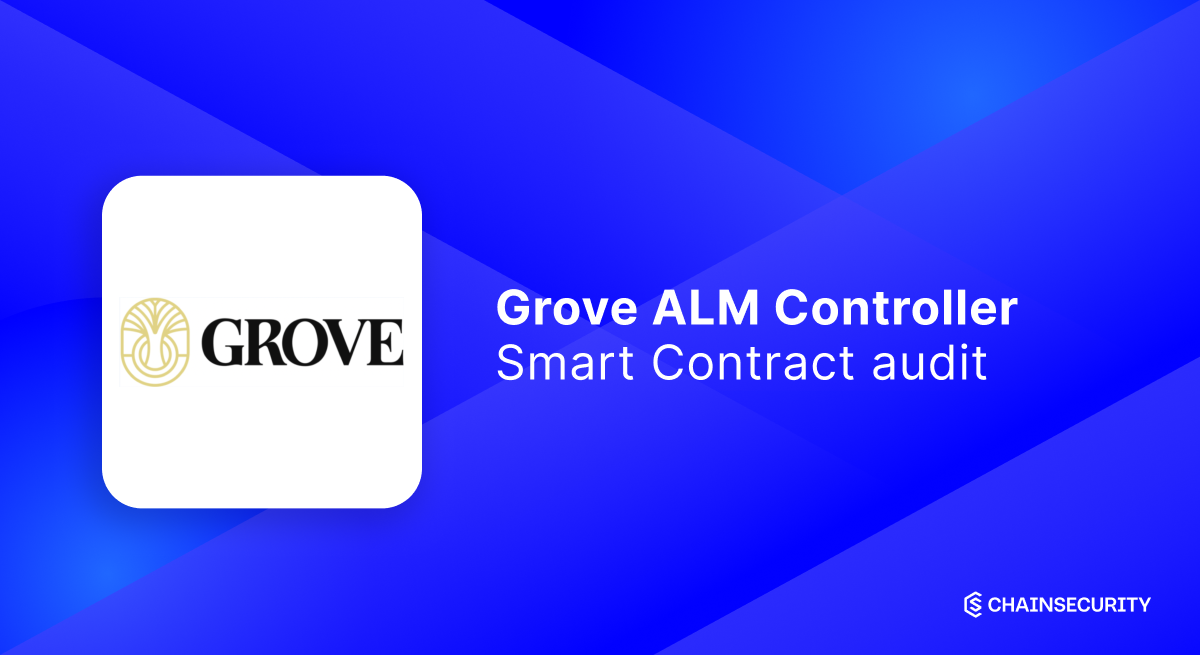

Summary
This review focused on the first version of Grove ALM Controller for which a separate review was conducted, covering functionality added since Spark ALM Controller v1.5.0, in particular the CentrifugeV3 integration.
The most critical subjects covered in our audit are access control, the correct integration with Centrifuge V3. The general subjects covered are gas efficiency, documentation and composability.
Security regarding all the aforementioned subjects is high.
It is important to note that security audits are time-boxed and cannot uncover all vulnerabilities. They complement but don't replace other vital measures to secure a project.
About Grove ALM Controller
GroveLabs offers Grove ALM Controller, a fork of Spark ALM Controller, that implements a set of on-chain components of the Grove Liquidity Layer designed to manage and control the flow of liquidity between Ethereum mainnet and L2s by leveraging Sky DSS Allocator.


Summary
The most critical subjects covered in our audit are functional correctness. The general subjects covered are documentation, specifications and gas efficiency.
In summary, we find that the codebase provides a high level of security.
It is important to note that security audits are time-boxed and cannot uncover all vulnerabilities. They complement but don't replace other vital measures to secure a project.
About Sky Rates Converter
Sky implements a rate converter (Conv) to facilitate the conversion between rates per second and yearly rates in basis points (BPS).
“The Sky Protocol (formely known as MakerDAO) is one of the largest dapps on the Ethereum blockchain. Designed by a disparate group of contributors, including developers within the MakerFoundation, its outside partners, and other persons and entities, it is the first decentralized finance (DeFi) application to see significant adoption.”


Summary
The most critical subjects covered in our audit are functional correctness, access control, and precision of arithmetic operations. Security regarding all the aforementioned subjects is high.
The general subjects covered are front-running and correct integration with other SKY system components. Security regarding all the aforementioned subjects is high.
In summary, we find that the codebase provides a high level of security.
It is important to note that security audits are time-boxed and cannot uncover all vulnerabilities. They complement but don't replace other vital measures to secure a project.
About Sky stUSDS
Sky implements stUSDS, an ERC-4626 compliant token that provides capital for SKY staking leverage hence segregates the risk of SKY-backed borrowing.
“The Sky Protocol (formely known as MakerDAO) is one of the largest dapps on the Ethereum blockchain. Designed by a disparate group of contributors, including developers within the MakerFoundation, its outside partners, and other persons and entities, it is the first decentralized finance (DeFi) application to see significant adoption.”
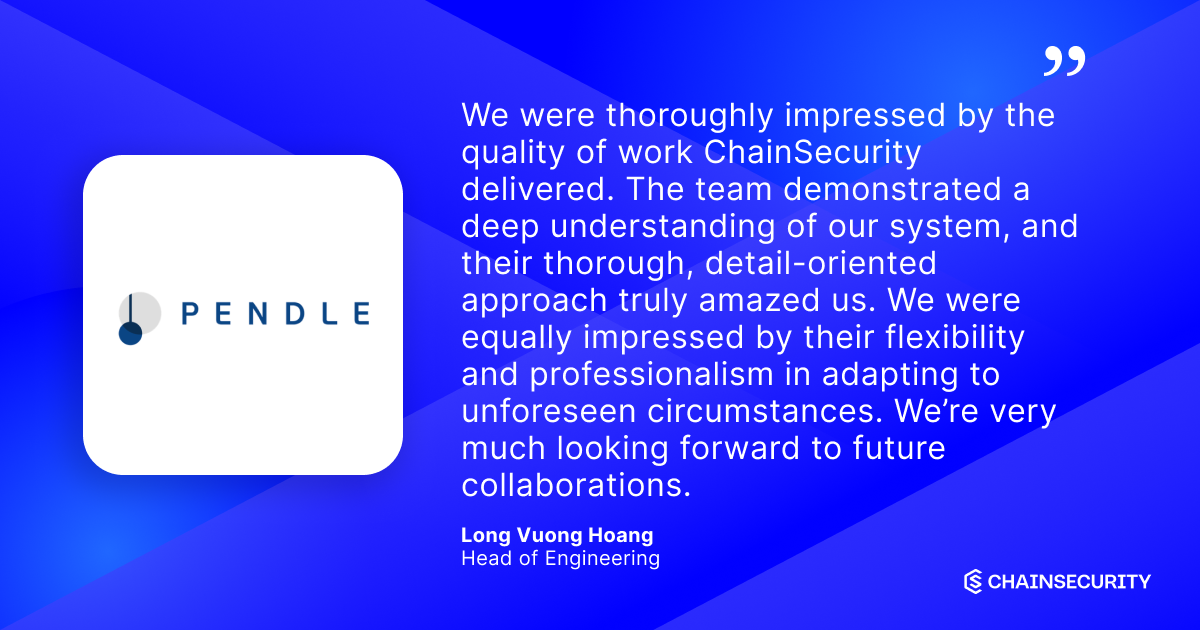

Summary
The most critical areas addressed in our audit are asset solvency, resistance to manipulation, and the precision of arithmetic operations. Security regarding asset solvency is high. In the first version (out of 5versions), an empty orderbook could lead to bad debt due to filling of orders at extreme prices, see High Priced Buy Order on Empty Orderbook Can Generate Bad Debt. The margin system has been revamped since version 2, fully resolving the issue by restricting the range in which orders can be created and enabling the admin to purge orders that fall outside this range. Resistance to price manipulation is good after the maximum allowable changes in the TWAP price have been lowered. TWAP instability could also be a concern if the spread is high, though it can be mitigated by Pendle's intention of lowering the spread and increasing the TWAP duration. Security regarding arithmetic operations is high. The rounding is performed in favor of the system and calculations are done with high precision.
General topics covered include code complexity, documentation and decentralization. Security regarding code complexity is good. The codebase is well-structured, though it makes extensive use of inline assembly, which bypasses many built-in safety checks. Security regarding documentation is high, with both a whitepaper and a specification available. Decentralization is improvable. Risk operations that are required to maintain the economic security of the protocol, such as order cancellation, order purging, and liquidations, are permissioned and can only be performed by whitelisted accounts. Users must trust the admin to perform these obligations at all times for the protocol to remain solvent.
In summary, we find that the codebase provides a good level of security. However, the settlement process, involving FTags, TickNonceData, MatchEvent, Quaternary Indexed Trees, and optimizedsorting (LibOrderIdSort), is exceptionally complex. While designed for efficiency, such complexity significantly increases the surface area for subtle bugs related to state consistency, off-by-one errors, or incorrect handling of edge cases. The margin logic is also mathematically complex, and incorrect mathematical modeling of the system, which is out of scope of this review, might lead to insolvency of certain users. The risks are mitigated by the upgradeable and pausable nature of the contracts. We recommend that Pendle implements extensive monitoring of the protocol to swiftly react in case of anomalies. The security of the system also vitally depends on the correct selection of market parameters, such as TWAP time window, maximum rate deviation, margin factors, and more. It is the responsability of Pendle to choose parameters that ensure the security of the system.
It is important to note that security audits are time-boxed and cannot uncover all vulnerabilities. They complement but don't replace other vital measures to secure a project.
About Pendle Boros Markets
Pendle implements Pendle Boros, a marketplace for Interest Rate Swaps based on oracle-reported rates and an on-chain orderbook, allowing cross-margined markets and leverage.
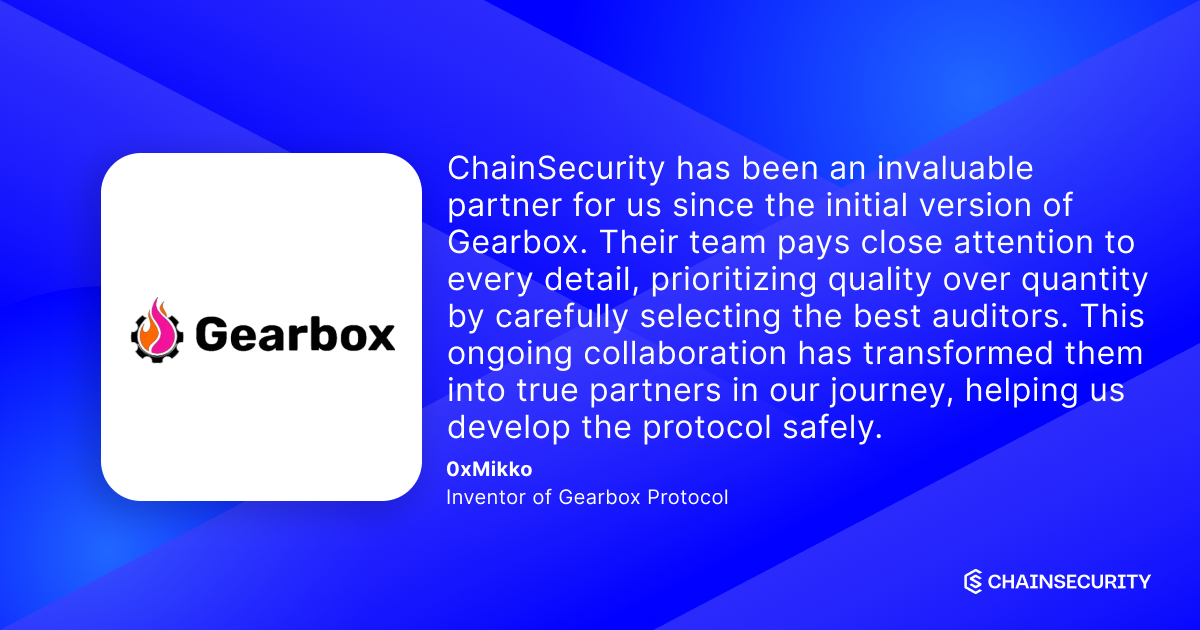

Summary
The most critical subjects covered in our audit are the correct instantiation of all system components, the migration logic of the legacy system, and the upgradeability, configurability, and liveness of the system. In the current implementation, neither the current system (Shutting down a market configurator) nor the legacy system can be fully configured (Legacy CreditManager cannot be fully configured). The migration of the legacy system is underspecified as it's not known which components of the legacy system will immediately be upgraded to newer versions. Moreover, the liveness of the system can be harmed in some cases (Reverting proposals lock cross-chain governance). Finally, upgrading some components of the system is not possible (Factory migration will fail).
The general subjects covered are functional correctness, gas consumption, testing, and documentation and specification. Testing was very limited in the first iteration of the report. This led to a substantial number of functional correctness issues (Timelock transactions can be executed before the ETA) that could have been prevented. Testing was significantly improved in subsequent versions. Some of the operations executed by Governance have very high gas requirements. Documentation is sufficient. However, some parts are underspecified (Signatures On Different Chains).
In summary, we find that the system provides a high level of security.
It is important to note that security audits are time-boxed and cannot uncover all vulnerabilities. They complement but don't replace other vital measures to secure a project.
About Gearbox Permissionless Smart Contracts
Gearbox implements a new governance system which aims to enable different risk curators to run their own gearbox markets. The new system allows the migration of the legacy system into the new system.
“Gearbox is a generalized leverage protocol: it allows anyone to take leverage in a DeFi-native way and then use it across various DeFi protocols. You take leverage with Gearbox and then use it on other protocols you already love. For example, you can leverage trade on Uniswap, leverage farm on Yearn or Curve and Convex, make complex delta-neutral strategies involving options and derivatives, get Leverage-as-a-Service for your structured product doing complex positions, etc.
The protocol has two sides to it: passive liquidity providers who earn higher APY by providing liquidity; – and active traders, farmers, or even other protocols who can borrow those assets to trade or farm with x4+ leverage.”


Summary
The most critical subjects covered in our audit are the functional correctness of the implementation, the possible execution flows, and the safety of the funds. Security regarding all the aforementioned subjects is high.
The general subjects covered are gas efficiency, authorization, documentation, and testing. As the Gearbox protocol interacts with many different assets and protocols, thorough e2e testing of the migration of accounts with different configurations and assets would benefit the implementation. Currently, the testing is quite limited. Security regarding the rest of the aforementioned subjects is high.
In summary, we find that the codebase could provide a high level of security should all the issues be fixed and no further issues be uncovered during the fixes review.
It is important to note that security audits are time-boxed and cannot uncover all vulnerabilities. They complement but don't replace other vital measures to secure a project.
About Gearbox Migration Bot
Gearbox implements the migration bot, a module that facilitates the migration of liquidity by closing a credit account and opening another one.
“Gearbox is a generalized leverage protocol: it allows anyone to take leverage in a DeFi-native way and then use it across various DeFi protocols. You take leverage with Gearbox and then use it on other protocols you already love. For example, you can leverage trade on Uniswap, leverage farm on Yearn or Curve and Convex, make complex delta-neutral strategies involving options and derivatives, get Leverage-as-a-Service for your structured product doing complex positions, etc.
The protocol has two sides to it: passive liquidity providers who earn higher APY by providing liquidity; – and active traders, farmers, or even other protocols who can borrow those assets to trade or farm with x4+ leverage.”
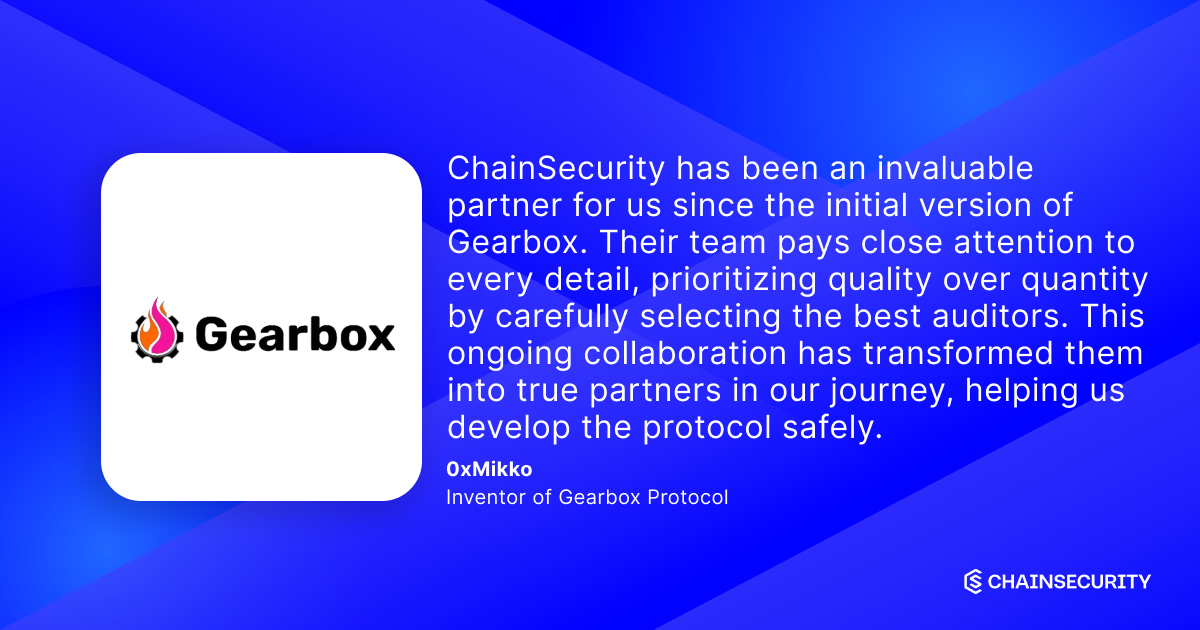

Summary
The most critical subjects covered in our audit are the functional correctness of the contracts, the adapter configuration, the movement of the assets, and the interaction with the rest of the Gearbox system. Changes between v3.0 and v3.1 of the core and their interaction with systems outside of the core, including the interaction with adapters in the scope of this review, are out of scope. Security regarding all the aforementioned subjects is high.
In Version 11, we have identified some issues regarding the Upshfit integration. Under certain conditions, the delay enforced by Upshift Vault can interfere with the expected liquidation flow, potentially leading to unexpected or increased loss for the liquidity providers. Gearbox Protocol accepted the risk and stated that it will be mitigated with proper configuration of the system.
The general subjects covered are access control, documentation and specification, gas efficiency, and the complexity of the implementation. Security regarding all the aforementioned subjects is high.
In summary, we find that the codebase would provides a high level of security. The interactions between different components of the Gearbox system are complex. The contracts in this scope have undergone many changes during the review. This in combination with the fact that the reviews are limited in time reduces our confidence in the assessment of the system's security level.
It is important to note that security audits are time-boxed and cannot uncover all vulnerabilities. They complement but don't replace other vital measures to secure a project.
About Gearbox V3.1 Integrations
This review focuses on changes of Gearbox Protocol to adapters and integrations interacting with third-party protocols.
—
“Gearbox is a generalized leverage protocol: it allows anyone to take leverage in a DeFi-native way and then use it across various DeFi protocols. You take leverage with Gearbox and then use it on other protocols you already love. For example, you can leverage trade on Uniswap, leverage farm on Yearn or Curve and Convex, make complex delta-neutral strategies involving options and derivatives, get Leverage-as-a-Service for your structured product doing complex positions, etc.
The protocol has two sides to it: passive liquidity providers who earn higher APY by providing liquidity; – and active traders, farmers, or even other protocols who can borrow those assets to trade or farm with x4+ leverage.”
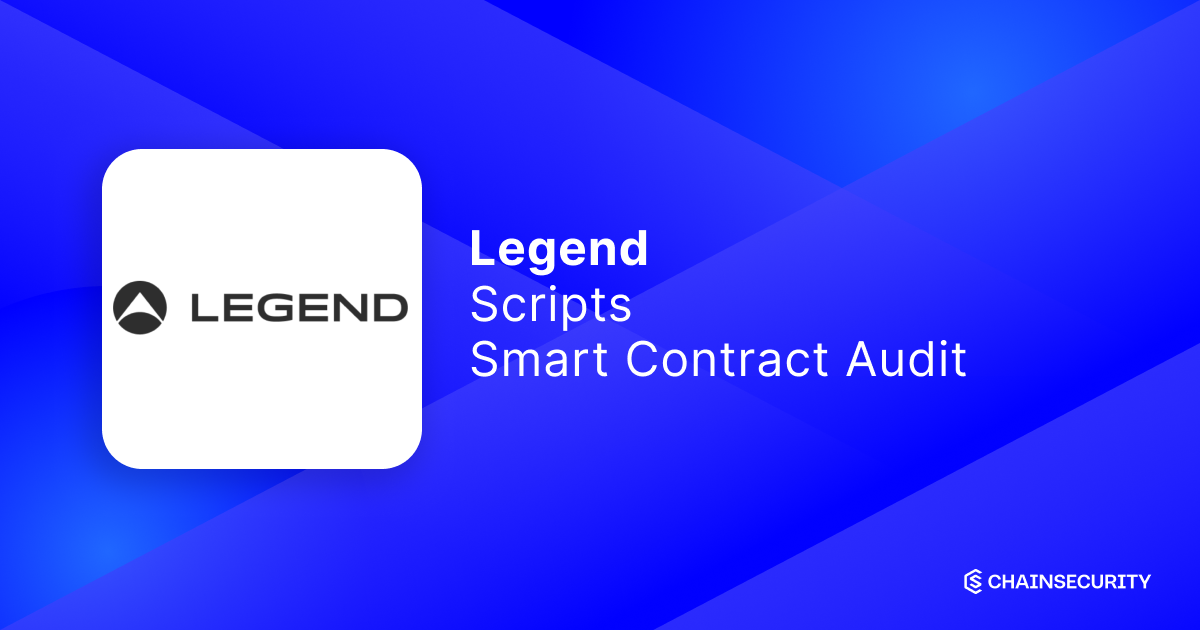

Summary
The most critical subjects covered in our audit are reentrancies, MEV, and dangling approvals. Security regarding all aforementioned subjects is high.
The general subjects covered are events, interaction with native tokens, and interoperability with common Metatransaction standards. Security regarding aforementioned subjects is high, however we have detailed the limitations of interoperability with batched operations in a note: TStoracle in bundled operations.
In summary, we find that the codebase provides a high level of security.
It is important to note that security audits are time-boxed and cannot uncover all vulnerabilities. They complement but don't replace other vital measures to secure a project.
About Legend Scripts
Legend Labs implements Legend Scripts, a suite of scripts that enable the Quark Wallet to interact with external contracts. In particular, Legend Labs implements bridging scripts, looping scripts, wrapping scripts, and swapping scripts.
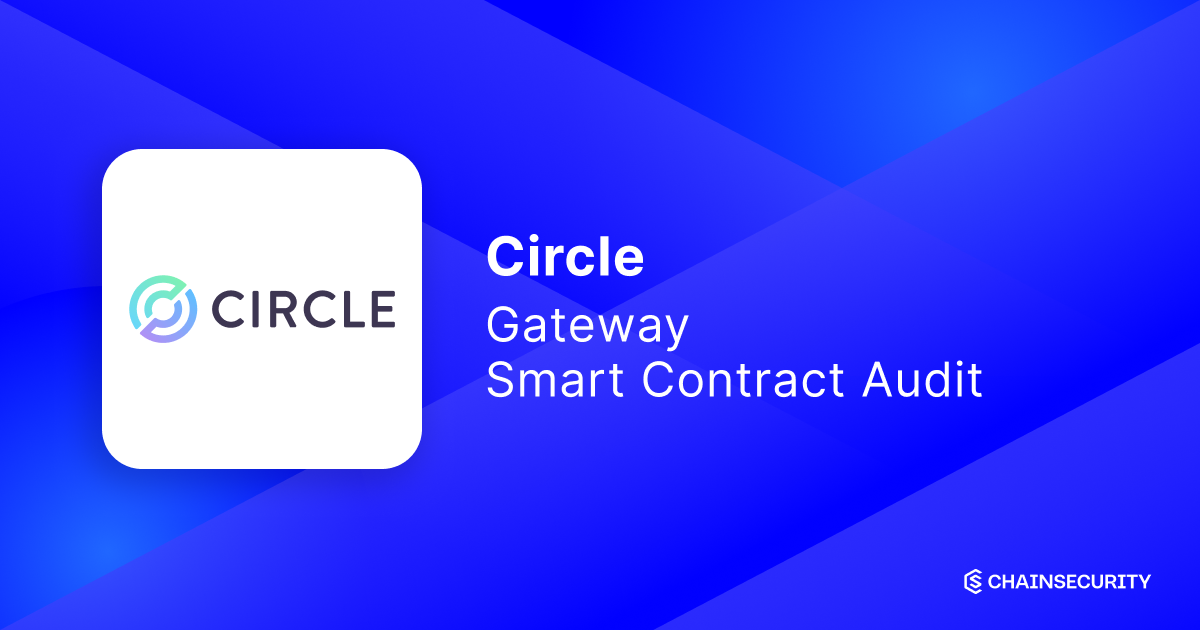
.svg)
Summary
The most critical subjects covered in our audit are functional correctness, signature handling, and access control. Security regarding all the aforementioned subjects is high. All issues identified in the intermediate reports have been resolved.
The general subjects covered are front-running, and gas efficiency. Some user operations may revert due to front-running, see Deposit with Permit / Authorization Is Susceptible to Griefing Attacks.
In summary, we find that the codebase provides a good level of security.
It is important to note that security audits are time-boxed and cannot uncover all vulnerabilities. They complement but don't replace other vital measures to secure a project.
About Circle Gateway Smart Contracts
Circle implements a set of smart contracts for Circle Gateway, a crosschain primitive that enables the bridging and aggregation of user's liquidity on any target chain with low latency.
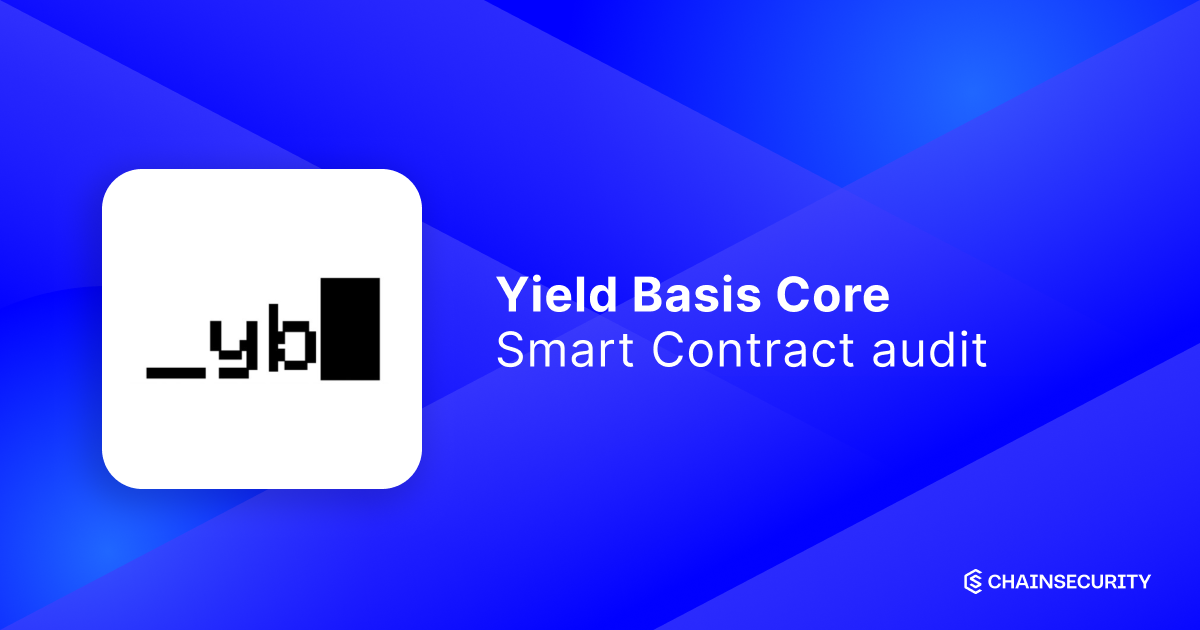
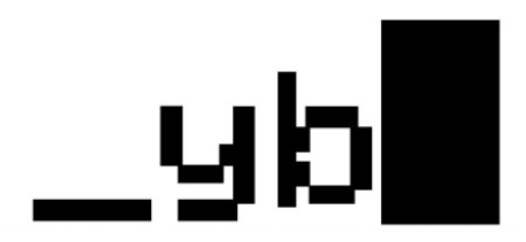
Summary
The most critical subjects covered in our audit are functional correctness, incentive compatibility, and access control. Functional correctness is high. Incentive compatibility is good but requires attention incertain scenarios, see Rational user will stake tokens during losses recovery. Access control is satisfactory with appropriate privileged role management.
The general subjects covered are event handling, documentation quality, and testing. Documentation is good. Whitepaper is a great help. Test suite would benefit from stateful testing that might help to uncover odd and undesired rounding issues.
In summary, we find that the codebase provides a good level of security.
It is important to note that security audits are time-boxed and cannot uncover all vulnerabilities. They complement but don't replace other vital measures to secure a project.
About Yield Basis Core
Yield Basis implements an Automated Market Maker (AMM) solution that protects liquidity providers from impermanent loss by maintaining constant leverage against Curve Cryptopool LP shares.
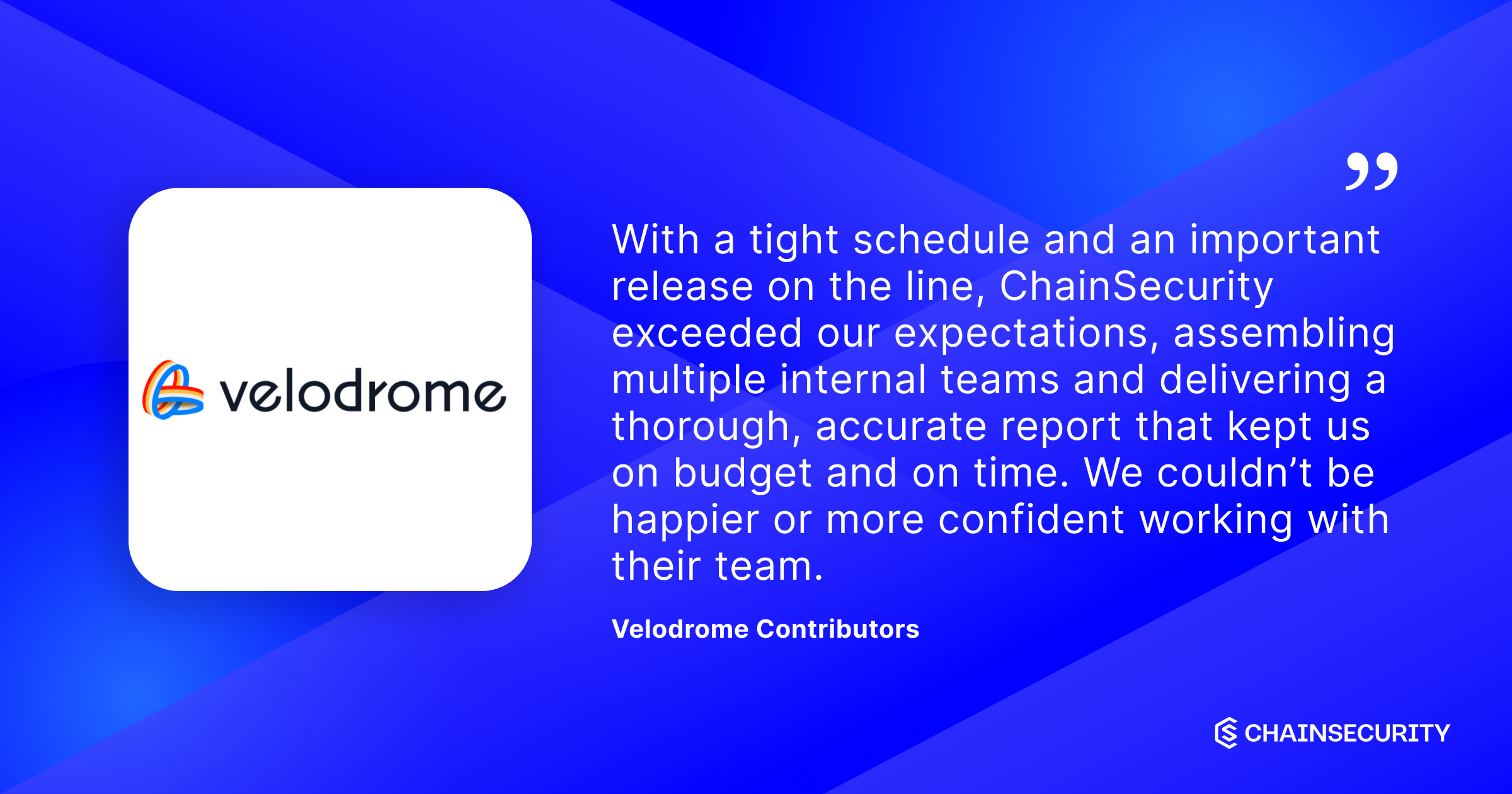

Summary
Our audit focused on critical subjects such as allowances management, integration with xVELO and xERC20 bridges, and interchain account integration for cross-chain actions. Allowance management security was found to be high, as previous concerns regarding arbitrary approvals have been addressed.
In addition, we reviewed general subjects including the correctness of Velodrome pools integration and the general functional correctness of the Router. The security of these general areas was also evaluated to be high, as previous issues with amount calculation for Uniswap V2 have been resolved.
The two notes, Router Allowance Trust Risk and Interchain Account Trust Risk, highlight significant differences in the trust model of the Superswap Router compared to the Uniswap Router. These differences should be carefully considered by users of the router, and when updating the router.
In summary, we find that the codebase provides a high level of security.
It is important to note that security audits are time-boxed and cannot uncover all vulnerabilities. They complement but don't replace other vital measures to secure a project.
About Velodrome Superswap Router
Velodrome implements an update to the Uniswap Universal Router contract with changes to support velodrome V2, Concentrate Liquidity Pools (CL), bridging tokens and executing arbitrary cross chain actions.


Summary
The most critical subjects covered in our audit are functional correctness and access control. Security regarding all the aforementioned subjects is high.
The general subjects covered are error handling, gas efficiency, and correct integration with the CreateXfactory. Security regarding all the aforementioned subjects is high.
In summary, we find that the codebase provides a high level of security.
It is important to note that security audits are time-boxed and cannot uncover all vulnerabilities. They complement but don't replace other vital measures to secure a project.
About Velodrome Verified ERC20
Velodrome implements the VerifiedERC20 system, which provides enhanced ERC20 tokens with pluggable hook functionality. The system is designed to be modular, such that new hooks can be later added, and comes with a set of hooks already implemented.
"Velodrome Finance is a next-generation AMM that combines the best of Curve, Convex and Uniswap, designed to serve as the liquidity hub for the Superchain."
.png)

Summary
The most critical subjects covered in our audit are functional correctness access control. Security regarding all the aforementioned subjects is high. Our most important finding is Transient validator variable override which allows some checks to be by passed as described in the issue. Unit testing is minimal, a deeper testing would likely have revealed this issue and might help to uncover other issues.
The general subjects covered are code EIP compliance, error handling, and correct integration. Security regarding all these subjects is high.
In summary, we find that the codebase currently provides a high level of security, but we recommand improving the tests to increase the confidence.
It is important to note that security audits are time-boxed and cannot uncover all vulnerabilities. They complement but don't replace other vital measures to secure a project.
About Gelato Smart Wallet
Gelato implements an EIP-7702-compatible Delegation smart wallet that also supports full account abstraction via EIP-4337, allowing an externally-owned account (EOA) to delegate control to smart-contract logic while retaining the same address.
.png)

Summary
The most critical subjects covered in our audit are access control, functional correctness, and Denial-of-Service vectors.
Security regarding access control is high, after an issue that allowed bypassing the token-gating system has been fixed, see Subscription Can Be Passed Around. Functional correctness is high, after issues with the royalty implementation has been fixed, see Royalty Payments With Native Tokens Break Marketplace Integrations. Security regarding Denial-of-Service vectors is high after the previously implemented refund mechanism was removed, see Refund Mechanism Can Be Abused to DOS a Series.
A general subject covered is gas efficiency. Gas efficiency was improved, see Burning Can Increase Withdraw Gas Cost and Gas Optimizations.
In summary, we find that the codebase provides a high level of security.
It is important to note that security audits are time-boxed and cannot uncover all vulnerabilities. They complement but don't replace other vital measures to secure a project.
About Neulock Smart Contracts
Studio V implements a storage contract to be used with an on-chain password manager. The access to the contract is gated through an NFT contract, with a points system attached.
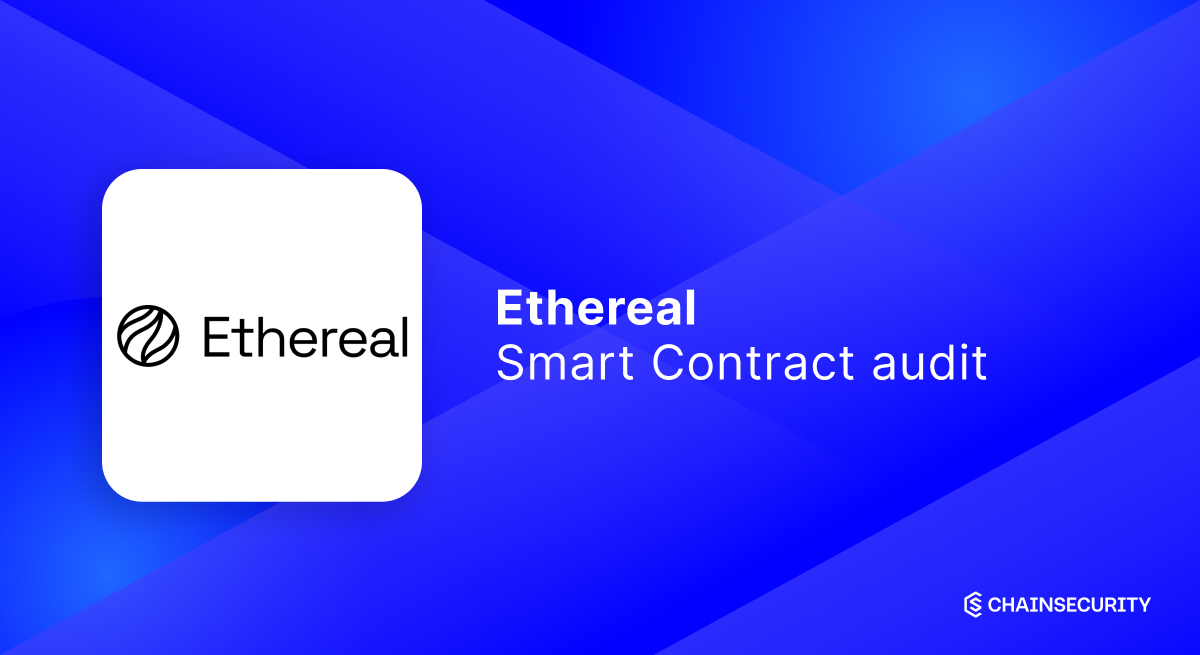

Summary
The most critical subjects covered in our audit are functional correctness, precision of arithmetic operations, signature handling and resilience.
Most of the issues provided in this report have been fixed. However, the team chooses to not mitigate risks associated with depegs of the underlying stable token.
In summary, we find that the codebase provides a good level of security.
It is important to note that security audits are time-boxed and cannot uncover all vulnerabilities. They complement but don't replace other vital measures to secure a project.
About Ethereal Smart Contracts
Ethereal implements a perpetual futures exchange. The system is comprised of smart contracts and an off-chain application. This review details the smart contracts.
.png)

Summary
The most critical subjects covered in our audit are access control, functional correctness, and precision of arithmetic operations. The general subjects covered are documentation, specifications, and gas efficiency.
Security regarding all aforementioned subjects is high.
In summary, we find that the codebase provides a high level of security.
It is important to note that security audits are time-boxed and cannot uncover all vulnerabilities. They complement but don't replace other vital measures to secure a project.
About USDD Smart Allocator Smart Contracts
Decentralized USD implements smart contracts for onboarding Smart Allocator as collateral for the USDD 2 system. The new contracts allow trusted Smart Allocator lenders to borrow USDD stablecoins against these assets, while managing debt repayment and liquidation.


Summary
The most critical subjects covered in our audit are security, functional correctness and seamless integration with the existing system. Security regarding all the aforementioned subjects is high.
In summary, we find that the codebase provides a high level of security.
It is important to note that security audits are time-boxed and cannot uncover all vulnerabilities. They complement but don't replace other vital measures to secure a project.
About Sky smart contracts
Sky implements a rebranded version of the MKR token and an immutable converter with a fixed conversion rate. The converter functions by minting and burning tokens. The new governance token is ERC-20 compliant and the converter allows for permissionless conversion between MKR and SKY tokens.
--
“The Sky Protocol (formely known as MakerDAO) is one of the largest dapps on the Ethereum blockchain. Designed by a disparate group of contributors, including developers within the MakerFoundation, its outside partners, and other persons and entities, it is the first decentralized finance (DeFi) application to see significant adoption.”
.png)
.svg)
Summary
The most critical subjects covered in our audit are external integrations with UMA and the ConditionalToken Framework, solvency such that refunds from a game are not spent by another game, and functional correctness of the state transitions, also with respect to asynchronous callbacks and admin actions. Security regarding all the aforementioned subjects is high.
The general subjects covered are documentation, testing, missing refunds, Denial of Service attacks and front-running. Security regarding all the aforementioned subjects is high. Documentation regarding the state transitions is expanded out in the following System Overview. During the review, an issue in the UMA protocol has been uncovered that could have affected the Polymarket contracts. The issue has been resolved with the collaboration of UMA.
In summary, we find that the codebase provides a high level of security.
It is important to note that security audits are time-boxed and cannot uncover all vulnerabilities. They complement but don't replace other vital measures to secure a project.
About UMA Sports Oracle
Polymarket implements UMA Sports Oracle, a smart contract that allows the creation of conditional tokens for bets on sport games. Several types of bets are possible for a given game. UMA Sports Oracle allows querying the game result only once in the UMA Optimistic Oracle to resolve the outcome of several bets.
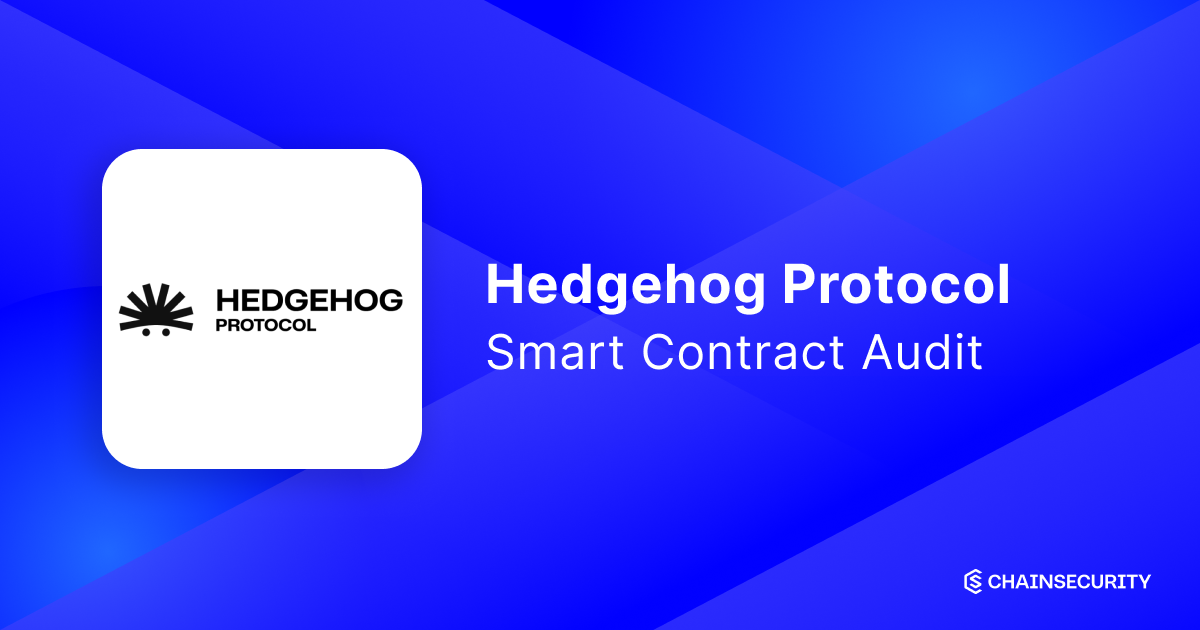

Summary
The most critical subjects covered in our review are functional correctness and access control. Initially, security regarding functional correctness was improvable, while security regarding access control was satisfactory. A set of severe issues were introduced in the initial versions of the codebase, mainly from two changes:
1. The debt token BaseFeeLMA was using 6 decimals
2. The Base fee oracle returned a price with 1 decimal and the token pair BaseFeeLMA:ETH
These changes were not reflected consistently in the codebase, hence breaking multiple pre-existing functions. These issues have been resolved in the final version.
In Version 4 of the codebase a new functionality to enforce a system-wide withdrawal limit was added. The implementation of this functionality introduced a set of new bugs, the most severe being Liquidations are blocked from Withdrawal Limit. These findings have been resolved in the final version.
The general subjects covered are trustworthiness, documentation, and testing. Security regarding trustworthiness have been improved throughout the review, but privileged roles in non-core contracts can still block user operations, see Trust Model and Roles. Documentation and specification are improvable and can be extended to describe the changes more thoroughly and systematically. The testing suite has been enhanced in the later iterations, but testing remains improvable. The tested contracts do not always match the deployed contracts (i.e. HogToken on Base) and not all code paths are covered by tests. Hence, we recommend further testing.
The final code version has some lower severity findings were (partial) risks have been accepted (seeOpen Findings).
It is important to note that security audits are time-boxed and cannot uncover all vulnerabilities. They complement but don't replace other vital measures to secure a project.
About Hedgehog Protocol
Hedgehog implements a hedging instrument for the change of the base fee on Ethereum mainnet. Hedgehog has forked Liquity v1 and adapted the smart contracts to implement the gas derivative used for hedging. This review was limited to the smart contract modifications applied by Hedgehog, under the assumption of Liquity's codebase being safe. However, it is important to acknowledge that any potential bug in Liquity could impact Hedgehog too.
"Hedgehog is an infrastructure for on-chain native derivatives, starting with Modular Synthetic Blockspace. Focusing on L2 rollups, validators, and AA paymasters, while providing trading opportunities for speculators and MEV searchers on speculating and hedging Basefee."


Summary
The most critical subjects covered in our audit are functional correctness, correct integration with the external system, and front-running. The general subjects covered are gas efficiency and access control.
Security regarding all the aforementioned subjects is high. The most notable issue Unpriced left tickets, resulting in computing incorrect position values, has been resolved.
In summary, we find that the codebase provides a good level of security.
It is important to note that security audits are time-boxed and cannot uncover all vulnerabilities. They complement but don't replace other vital measures to secure a project.
About Enzyme Sulu Extensions XXIV
Enzyme Foundation implements an upgrade for the Stakewise v3 external position to add support for newer versions of Stakewise v3 vaults while disabling the support for versions supported previously. Note that the upgrade is required due to breaking changes in Stakewise v3 that were not covered in the initial review of the Stakewise v3 external position.
Enzyme is a decentralised asset management infrastructure built on Ethereum. Using Enzyme Smart Vaults, individuals and communities can build, scale and monetise investment (or execution) strategies that employ the newest innovations in decentralised finance.
.png)

Summary
The most critical subjects covered in our audit are multi-chain state consistency, functional correctness, Hyperlane integration, and frontrunning resistance.
The mechanisms ensuring consistent state across chains are robust and deliver a high level of security. The functional correctness is high as issues such as Voting period in epochs can be bypassed by using poke() have been resolved. Similarly, the integration with Hyperlane's bridging mechanism was found to be correct after issues such as Metadata Misuse in Bridges were resolved.
In the second version of the codebase, the mechanism enforcing the ordering of specific types of messages (DEPOSIT and WITHDRAW) was relaxed. This could lead the state of some contracts to be temporarily inconsistent which would lead to accounting issues (Voting power can be temporarily artificially inflated). The issue has been addressed, but it should be noted that the system relies heavily on the assumption that messages from the root to the leaf will be processed within 1 hour.
In summary, we find that the codebase provides a high level of security.
It is important to note that security audits are time-boxed and cannot uncover all vulnerabilities. They complement but don't replace other vital measures to secure a project.
About Velodrome Superchain Interoperability
Velodrome implements an expansion of Velodrome AMM system to Superchain. With this expansion, the VELO rewards and incentives become available on chains beyond Optimism with the help of Hyperlane.
"Velodrome Finance is a next-generation AMM that combines the best of Curve, Convex and Uniswap, designed to serve as the liquidity hub for the Superchain."
.png)

Summary
The most critical subjects covered in our audit are accounting correctness, reentrancies, and interactions with Stability Pools. In Version 3 , security regarding all the aforementioned subjects is high. The possibility of value extraction through self-liquidations has been mitigated. Issues regarding the interaction with Liquity V2 Stability pools that were present in Version 1 have been fully remediated. The logic in Liquity V2 Stability Pools has been modified between Version 2 and Version 3 of this codebase. A minor integration issue is introduced by the new Stability Pool logic (withdraw fail because stability pool cannot be emptied).
The general subjects covered are testing, price conversions, fees, and ERC-4626 compliance. Testing is improvable, a number of issues were uncovered that should have been found through testing. Incorrect price conversions, inconsistent handling of fees, and low ERC-4626 standard compliance have all been addressed and are now appropriate.
In summary, we find Version 3 provides a good level of security.
It is important to note that security audits are time-boxed and cannot uncover all vulnerabilities. They complement but don't replace other vital measures to secure a project.
About sBOLD
K3 Capital implements sBOLD, an ERC4626 vault that deposits BOLD into Liquity V2 stability pools, providing a tokenization and asset allocation layer on top of Liquity V2 Stability Pool deposits.
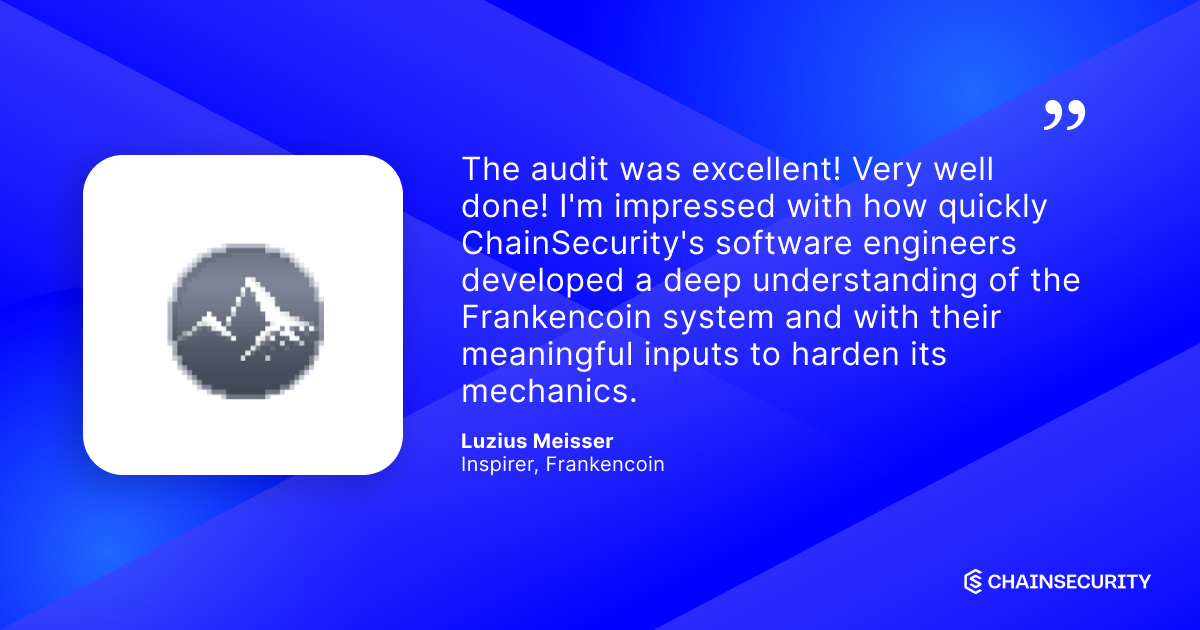

Summary
The most critical subjects covered in our audit are functional correctness and the synchronization of the state between mainnet and the sidechains.
Functional correctness was improved after a wrong assertion, that could have led to loss of data, was corrected.
The synchronization of data between different chains is sufficient although some caveats in regards to out-of-order execution and partial data transfers should be noted.
In summary, we find that the codebase provides a good level of security.
It is important to note that security audits are time-boxed and cannot uncover all vulnerabilities. They complement but don't replace other vital measures to secure a project.
About Frankencoin CCIP Bridge
Frankencoin implements a bridging system for the ZCHF token as well as some governance mechanisms. ZCHF on chains other than mainnet allow for tokens to be deposited into savings contracts that earn interest. Accrued interest, the interest rate, and governance voting power are asynchronously and permissionlessly transferred between mainnet and the respective sidechains using the bridge.
“Frankencoin is a collateralized, oracle-free stablecoin that tracks the value of the Swiss franc. Its strengths are its decentralization and its versatility.”
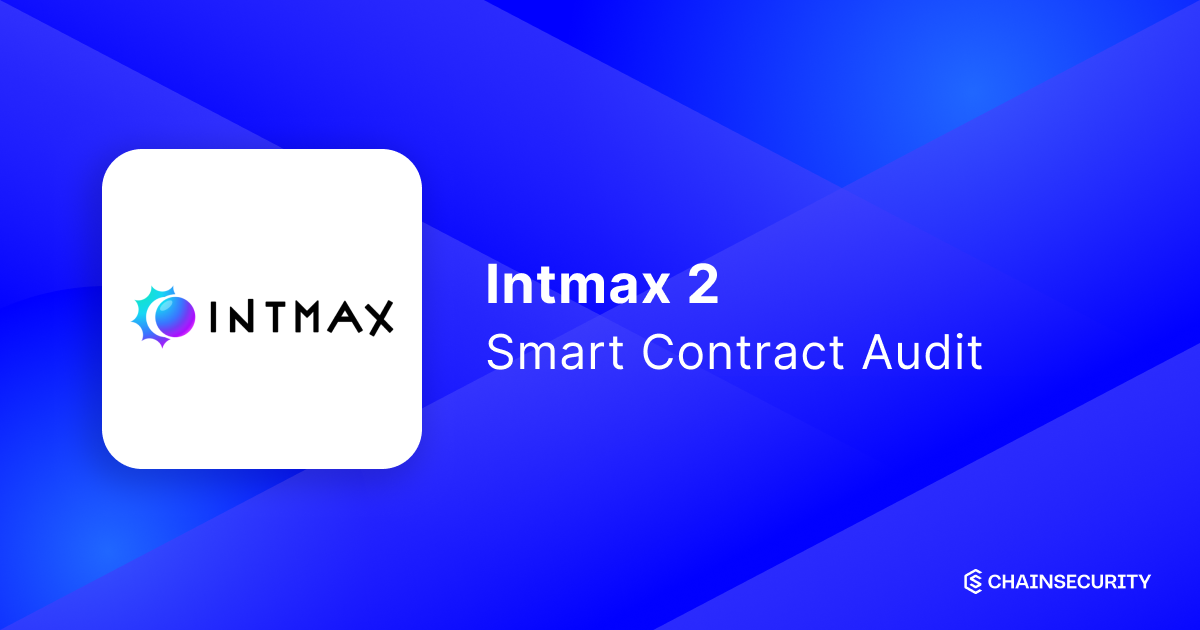

Summary
The most critical subjects covered in our audit are general liveness of the rollup, denial of services, and user assets safety. Security regarding all subjects is good.
The other general subjects covered are correct usage of Scroll Messenger, access control, and global interaction between the contracts. Security regarding all the aforementioned subjects is high.
In summary, we find that the codebase provides a high level of security.
Given the small amount of tests in the codebase, we strongly recommend enhancing the testing suite as several issues found in the audit could have been caught by more extensive testing.
It is important to note that security audits are time-boxed and cannot uncover all vulnerabilities. They complement but don't replace other vital measures to secure a project.
About Intmax 2 Smart Contracts
Intmax implements a zk-rollup for private transfers. Liquidity is on/offboarded on Ethereum while the state of the rollup is managed on Scroll.
"INTMAX is an extremely scalable layer for Ethereum transfers that incorporates ethically sound privacy. It is a stateless zkRollup structure, theoretically achieving scalability similar to Plasma and Lightning Network, as envisioned in 2018. By distributing both data and computation costs across users’ devices, INTMAX inherits security from Ethereum while achieving scalability even greater than centralized financial systems using databases."
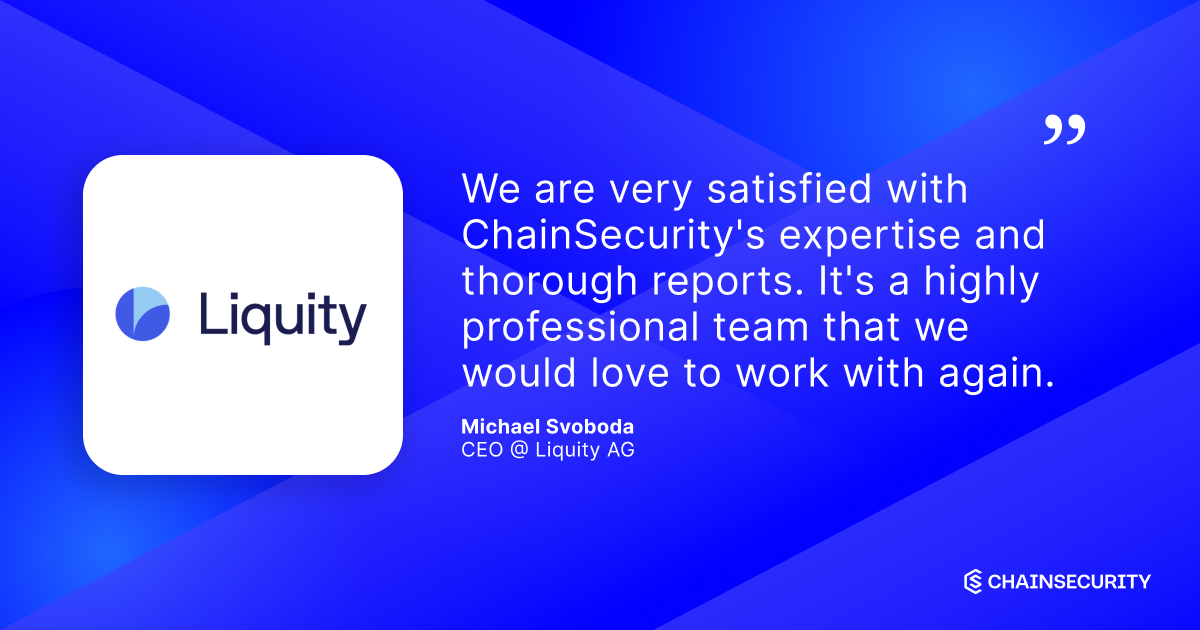

Summary
The most critical subjects covered in our audit are functional correctness, rounding issues, and correctness of external integrations. The security regarding functional correctness is high, after issues in prior versions were resolved: Zappers can lose user funds. Security regarding rounding issues has been improved after the amount of share inflation was restricted, see Rounding in debt shares calculation can mint unbacked tokens. Security regarding external integrations is high, as issues with Balancer and Leverage Zapper have been resolved: BalancerFlashLoan missing access control and Leverage zappers do not return swap excess.
The general subjects covered are documentation, trustworthiness and code complexity. The project has very extensive documentation. The trustworthiness is high, as the system is designed to be immutable with limited trust assumptions. The system's contracts are very complex, which carries increased risk compared to simpler code.
In summary, we find that the core contracts provide a good level of security.
It is important to note that security audits are time-boxed and cannot uncover all vulnerabilities. They complement but don't replace other vital measures to secure a project.
About Liquity Bold Smart Contracts
Liquity implements Liquity V2, a decentralized stablecoin system with user set interest rates, iterating on Liquity V1.
"Liquity V2 is a decentralized borrowing and stablecoin protocol that builds on the success of V1. It enhances it in several ways to offer the best borrowing experience, a highly resilient Ethereum-native stablecoin (BOLD), and sustainable on-chain yield."
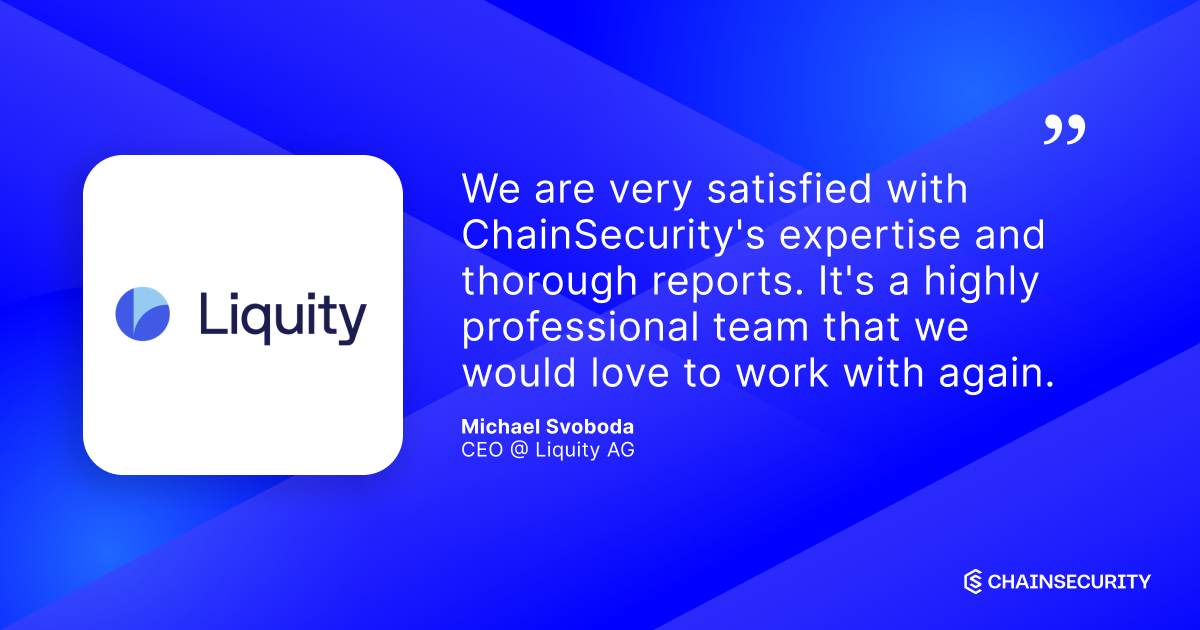

Summary
The most critical subjects covered in our audit are functional correctness, rounding issues, and correctness of external integrations. The security regarding functional correctness is high, after issues in prior versions were resolved: Zappers can lose user funds. Security regarding rounding issues has been improved after the amount of share inflation was restricted, see Rounding in debt shares calculation can mint unbacked tokens. Security regarding external integrations is high, as issues with Balancer and Leverage Zapper have been resolved: BalancerFlashLoan missing access control and Leverage zappers do not return swap excess.
The general subjects covered are documentation, trustworthiness and code complexity. The project has very extensive documentation. The trustworthiness is high, as the system is designed to be immutable with limited trust assumptions. The system's contracts are very complex, which carries increased risk compared to simpler code.
In summary, we find that the core contracts provide a good level of security.
It is important to note that security audits are time-boxed and cannot uncover all vulnerabilities. They complement but don't replace other vital measures to secure a project.
About Liquity Bold Smart Contracts
Liquity implements Liquity V2, a decentralized stablecoin system with user set interest rates, iterating on Liquity V1.
"Liquity V2 is a decentralized borrowing and stablecoin protocol that builds on the success of V1. It enhances it in several ways to offer the best borrowing experience, a highly resilient Ethereum-native stablecoin (BOLD), and sustainable on-chain yield."
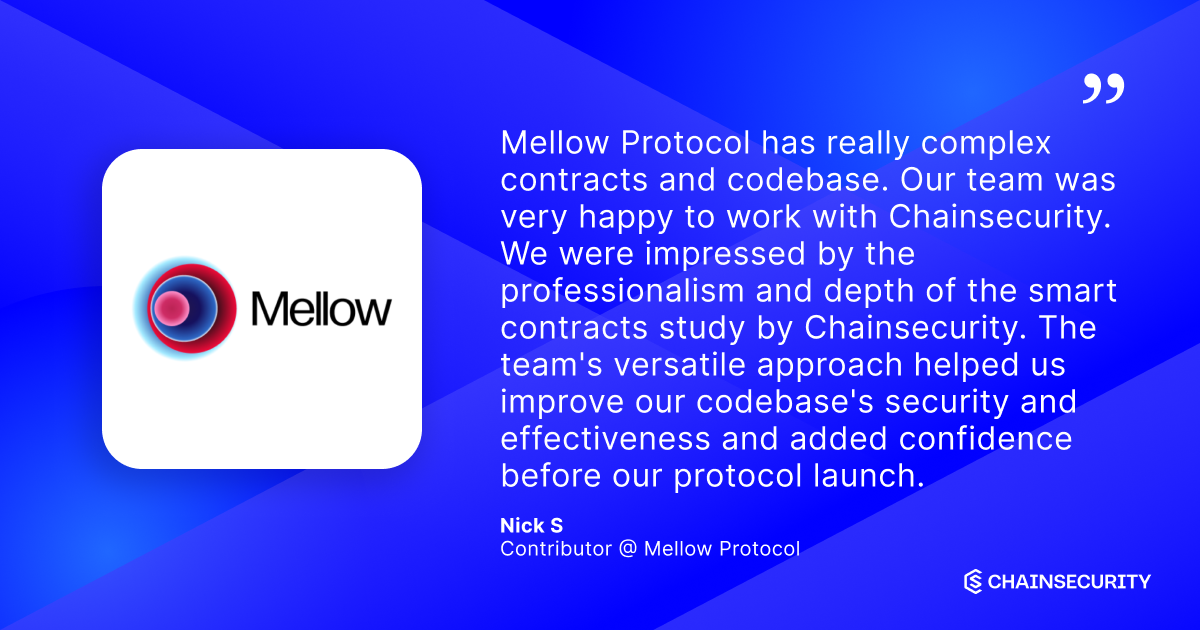

Summary
The most critical subjects covered in our audit are asset solvency, functional correctness, and frontrunning. The general subjects covered are upgradeability, unit testing, documentation, and trustworthiness. Note that testing is insufficient and that some of the uncovered issues could've been caught by testing.
The most notable findings are:
- The Incorrect Valuation of ERC-4626 that leads to incorrect share prices potentially leading to a loss of funds.
- An Escalation of Privileges that could allow addresses with low privileges to drain the protocol.
- Architectural problems such as Pending Assets Become Claimed During Withdrawal and Insufficient Limitations for Strategies that could have led to DoS scenarios
- Integration issues such as Operator Undelegations Are Not Accounted for that could've led to loss of funds.
-
All issues have been resolved through code corrections or specification change. Some lower severity issues have been acknowledged, and their risk has been accepted.
Additionally, please consult Notes, Assessment Overview and Trust Model and Roles for considerations that could be out of scope.
In summary, we find that the codebase provides a good but improvable level of security.
It is important to note that security audits are time-boxed and cannot uncover all vulnerabilities. They complement but don't replace other vital measures to secure a project.
About Mellow Multivault Smart Contracts
Mellow Finance implements an upgrade to the previously audited vaults to support multiple LRTs at once as well as other ERC-4626 compliant protocols. The multivault architecture implements a modular integration framework by leveraging adapters for integrations and strategies for allocations. Given the delayed withdrawals for LRTs, specialized withdrawal queues have been implemented.
"Mellow LRT is an innovative liquid restaking primitive allowing permissionless creation of modular LRTs. Mellow offers a series of vault smart contracts tailored to different risk profiles, managed by LRT curators."
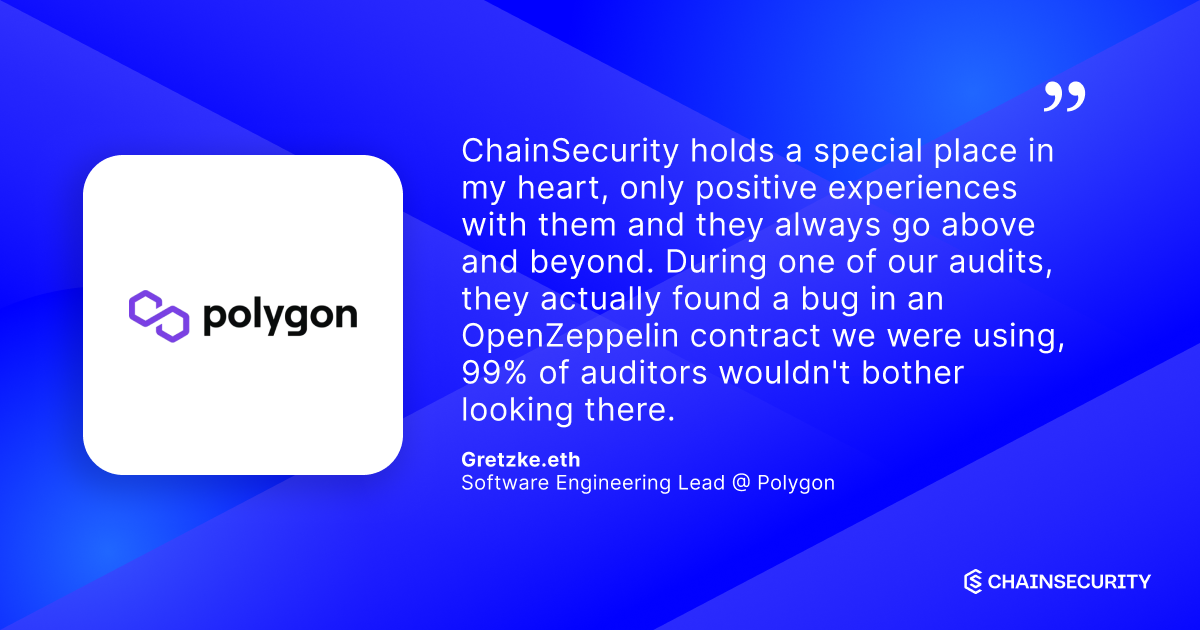

Summary
The most critical subjects covered in our audit are functional correctness, accounting correctness, and the integration with external systems (Bridge and Morpho vaults).
Functional correctness is good, after missing conversions between asset amounts and share amounts have been fixed, see drainVault Cannot Withdraw All Assets and Missing Asset-Share Conversions in Vaults. Accounting correctness is good, as related issues have been fixed, see drainVault Locks Assets. Security regarding integration with external systems is high.
In summary, we find that the codebase provides a good level of security.The Notes section highlights behavior that users should be aware of.
It is important to note that security audits are time-boxed and cannot uncover all vulnerabilities. They complement but don't replace other vital measures to secure a project.
About Polygon Vault Bridge Token
Polygon implements an extension of the Unified Bridge (formerly LxLy Bridge) that enables the bridging of assets that have been deposited into an ERC-4626 yield-generating vault. Additionally, Polygon provides a Native Converter deployed on Layer Y that allows assets that were natively bridged (not via the VaultBridgeToken extension) to be converted to vault-bridged tokens, with the underlying token being bridged back to Layer X.
“Polygon is a decentralised Ethereum scaling platform that enables developers to build scalable user-friendly dApps with low transaction fees without ever sacrificing on security.”
.png)

Summary
The most critical subjects covered in our audit are asset solvency, functional correctness, and compliance with standards. After the review, security regarding all the aforementioned subjects is high. A critical issue leading to the free minting of shares was uncovered in the first review of the codebase and was addressed in the first round of fixes, see Shares can be minted for free. In Version 2 there was an issue regarding the initialization of the system, see Order of Deployment and Initialization.
The general subjects covered are code complexity, gas efficiency, trustworthiness, documentation and specification. Security regarding all the aforementioned subjects is generally good. No specifications were provided regarding management of the funds. Note the strong assumptions made in the TrustModel.
In summary, we find that the codebase provides a good level of security.
It is important to note that security audits are time-boxed and cannot uncover all vulnerabilities. They complement but don't replace other vital measures to secure a project.
About UltraYield Smart Contracts
Ultra implements UltraVault, an ERC-7540 compliant, managed vault with asynchronous redemption.
"UltraYield is an onchain strategy curator working with top-tier protocols to bring depositor the highest yield possible on the market."
.png)

Summary
The most critical subjects covered in our audit of the circuits are soundness, completeness and zero-knowledge. Several critical issues have been uncovered including:
• Missing constraint on pubkey allows for double spending
• Incorrect exclusion proof circuit allows for double spending
• Multiple Valid Account Trees / Public States after applying the same block
The latest iteration covers refinements in the core circuits, refactored withdrawal circuits and the new claim circuits.
The reviewed code is well-structured and properly documented. Although testing has been continuously enhanced, a thorough stress test on a public testnet is recommended before mainnet launch due to the project’s cutting-edge nature. The circuits are part of Intmax 2, a system which consists of multiple interacting parts. The rollup is managed by a set of smart contracts which have been audited in the ChainSecurity Intmax 2 Smart Contract Audit Report.
In summary, we find that the current codebase provides a good level of security.
It is important to note that security audits are time-boxed and cannot uncover all vulnerabilities. They complement but don't replace other vital measures to secure a project.
About Intmax 2 ZKP Circuits
Intmax implements a zk-rollup for private transfers using zk proofs to prove state transitions and balances. Smart contracts on Scroll manage the rollup, while smart contracts on Ethereum handle liquidity on- and offboarding.
"INTMAX is an extremely scalable layer for Ethereum transfers that incorporates ethically sound privacy. It is a stateless zkRollup structure, theoretically achieving scalability similar to Plasma and Lightning Network, as envisioned in 2018. By distributing both data and computation costs across users’ devices, INTMAX inherits security from Ethereum while achieving scalability even greater than centralized financial systems using databases."


Summary
The most critical subjects covered in our audit are functional correctness, frontrunning resistance, and integration with other contracts of the system.
Security regarding all the aforementioned subjects is high. Note that the Chief migration requires strong coordination and adherence to timelines to minimize the risk of governance attacks at different migration phases, see Migration Considerations for more details.
In summary, we find that the codebase provides a high level of security.
It is important to note that security audits are time-boxed and cannot uncover all vulnerabilities. They complement but don't replace other vital measures to secure a project.
About Sky Chief Migration smart contracts
Sky offers deployment and initialization libraries to migrate the existing MCD_ADM (the legacy Chief withMKR as governance token) to a new Chief that uses SKY as governance token.
Sky implements a rate converter (Conv) to facilitate the conversion between rates per second and yearly rates in basis points (BPS).
“The Sky Protocol (formely known as MakerDAO) is one of the largest dapps on the Ethereum blockchain. Designed by a disparate group of contributors, including developers within the MakerFoundation, its outside partners, and other persons and entities, it is the first decentralized finance (DeFi) application to see significant adoption.”


Summary
The most critical subject covered in our audit is functional correctness. After the intermediate report, all findings have been resolved, hence security regarding functional correctness is high.
The general subjects covered are trustworthiness and documentation. Security regarding all the aforementioned subjects is high.
In summary, we find that the codebase provides a high level of security.
It is important to note that security audits are time-boxed and cannot uncover all vulnerabilities. They complement but don't replace other vital measures to secure a project.
About Sky DSS Emergency Spells
Sky implements DssEmergencySpells, a set of pre-defined emergency spells that bypass the governance delay defined in DSPause to enable prompt governance actions if necessary.
“The Sky Protocol (formely known as MakerDAO) is one of the largest dapps on the Ethereum blockchain. Designed by a disparate group of contributors, including developers within the MakerFoundation, its outside partners, and other persons and entities, it is the first decentralized finance (DeFi) application to see significant adoption.”
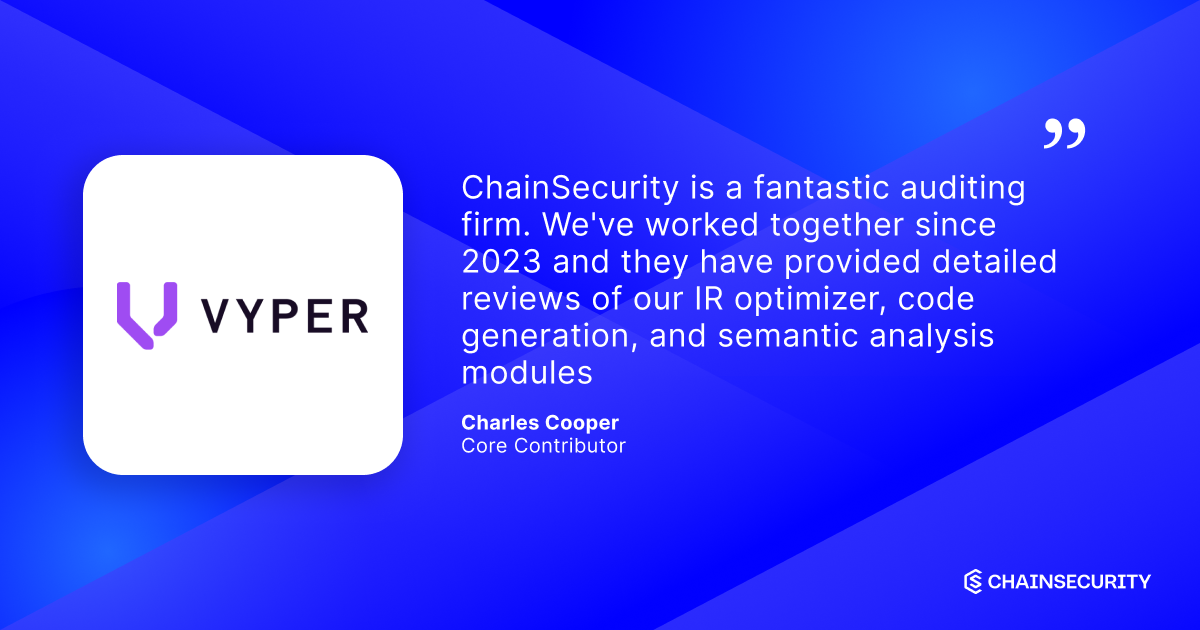

Summary
Limited code reviews are best-effort checks and don't provide assurance comparable to non-limited code assessments or audits. Due to time and scope constraints, they are not exhaustive.
The most critical subjects covered in our review are the non-reentrancy by default option and the raw_create builtin. Security regarding all the aforementioned subjects is high. Moreover, we found that allowing users to turn on the non-reentrancy by default option is a good security measure that benefits language users greatly.
Other general subjects covered include enabling bitwise operators for bytesM, extending as_wei_value to all numeric types, refactoring decorator and pragma parsing as well as other smaller pull requests. Security regarding all the aforementioned subjects is also high.
It is important to note that security reviews are time-boxed and cannot uncover all vulnerabilities. They complement but don't replace other vital measures to secure a project.
About Vyper Compiler 0.4.2 Pull Requests
This limited review was conducted by one engineer over one week and focused on multiple pull requests of the to-be-released version 0.4.2 of the Vyper compiler.
“Vyper is a contract-oriented, pythonic programming language that targets the Ethereum Virtual Machine (EVM).”


Summary
The most critical subjects covered in our audit are functional correctness, asset solvency and integration into the system. Security regarding all the aforementioned subjects is high.
The general subjects covered are usability and access control. Security regarding all the aforementioned subjects is high.
In summary, we find that the codebase provides a high level of security.
It is important to note that security audits are time-boxed and cannot uncover all vulnerabilities. They complement but don't replace other vital measures to secure a project.
About Sky VoteDelegate Smart Contracts
VoteDelegate implements a vote delegation system allowing governance token holders to delegate their voting power to delegates.
“The Sky Protocol (formely known as MakerDAO) is one of the largest dapps on the Ethereum blockchain. Designed by a disparate group of contributors, including developers within the MakerFoundation, its outside partners, and other persons and entities, it is the first decentralized finance (DeFi) application to see significant adoption.”
.png)
.svg)
Summary
The most critical subjects covered in our audit are correctness of the minting and burning flow, the implementation of the access control, and the sanitization of the data accounts. Security regarding all the aforementioned subjects is high. Only minor issues have been uncovered which have been addressed.
The general subjects covered are compute unit efficiency of the implementation, the documentation and specification, and testing. Security regarding all the aforementioned subjects is high.
In summary, we find that the codebase provides a high level of security.
It is important to note that security audits are time-boxed and cannot uncover all vulnerabilities. They complement but don't replace other vital measures to secure a project.
About WBTC
WBTC implements a system that allows for minting and burning wBTC on Solana.
"Wrapped Bitcoin (WBTC) unlocks the power of Bitcoin on various blockchains such as Ethereum and Solana, offering interoperability for DeFi use cases."


Summary
The most critical subjects covered in our audit are functional correctness, access control and the upgrade path from previous versions. Security regarding all the aforementioned subjects is high.
The general subjects covered are code complexity, specifications, and trustworthiness. Overall, the code is of high quality, well tested and documented.
In summary, we find that the codebase provides a high level of security.
It is important to note that security audits are time-boxed and cannot uncover all vulnerabilities. They complement but don't replace other vital measures to secure a project.
About Argent Accounts v0.5.0
Argent implements Argent Account and Multisig Account, a set of smart contracts built on top of Starknet's Account Abstraction. This review covers version 0.5.0, which introduces support for multiple owners and guardians in the Argent Account. Compared to version 0.4.0 (and 0.2.0 for the Multisig), the core functionality remains largely unchanged, with most updates focused on internal refactoring and enhanced support for the WebAuthn signer.


Summary
The most critical subject covered in our audit is functional correctness. The general subjects covered are trustworthiness and documentation. Security regarding all the aforementioned subjects is high.
In summary, we find that the codebase provides a high level of security.
It is important to note that security audits are time-boxed and cannot uncover all vulnerabilities. They complement but don't replace other vital measures to secure a project.
About Protego Smart Contracts
Sky implements Protego, a framework for standardizing the deployment of Emergency Spells that drop proposals queued for execution.
“The Sky Protocol (formely known as MakerDAO) is one of the largest dapps on the Ethereum blockchain. Designed by a disparate group of contributors, including developers within the MakerFoundation, its outside partners, and other persons and entities, it is the first decentralized finance (DeFi) application to see significant adoption.”
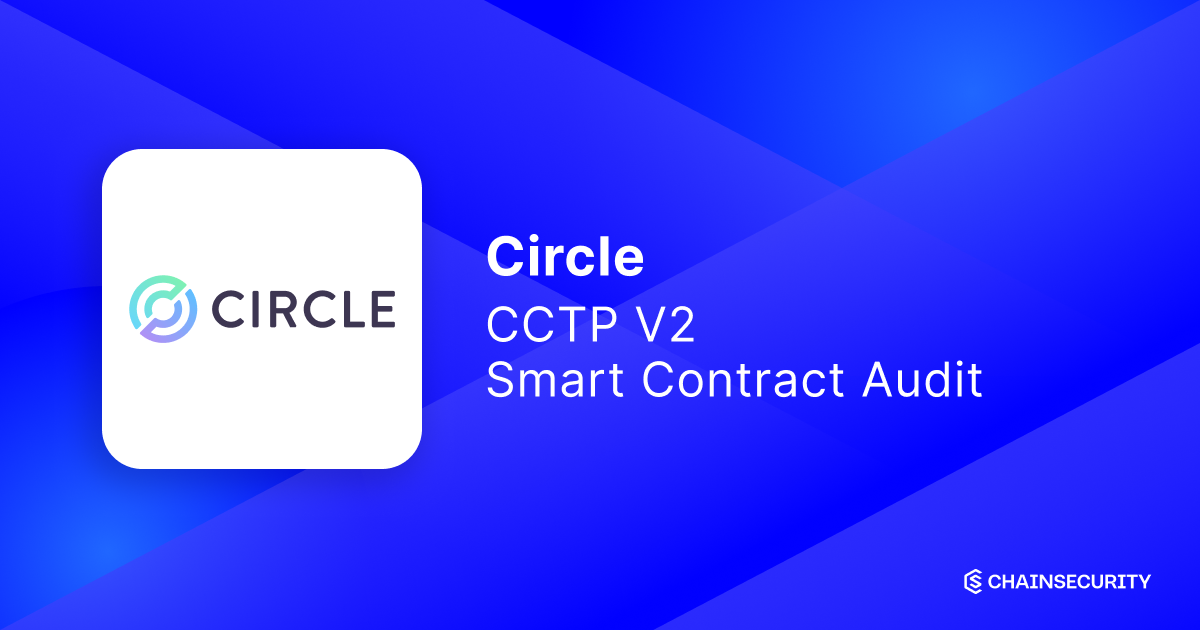
.svg)
Summary
The most critical subjects covered in our audit are signature handling, event handling, and access control. Security regarding all the aforementioned subjects is high.
The general subjects covered are functional correctness, upgradability, trustworthiness, and documentation. The core contracts in the scope of this review are upgradeable and fully controlled by an admin role. In addition, several accounts are required to be trusted, see Roles and Trust Model andPotential Single Points of Failure. The project has extensive documentation and inline code specification.
In summary, we find that the codebase provides a high level of security.
It is important to note that security audits are time-boxed and cannot uncover all vulnerabilities. They complement but don't replace other vital measures to secure a project.
About CCTP V2 Smart Contracts
Circle implements a new version of Cross-Chain Transfer Protocol (CCTP) that implements new features, such as fast burn messages and hook data. CCTP v2 uses new message formats that are incompatible with the previous version. Two versions of CCTP are treated as distinct networks in the smart contract level and use a different set of attesters.
.png)

Summary
The most critical subjects covered in our audit are asset solvency, function correctness and access control. The general subjects covered are specification and trustworthiness.
The most notable issue uncovered is the possibility of Stealing Operator Rewards. The finding has been addressed through code correction.
In summary, we find that the codebase provides a good level of security.
It is important to note that security audits are time-boxed and cannot uncover all vulnerabilities. They complement but don't replace other vital measures to secure a project.
About Symbiotic Default Rewards
Symbiotic provides default contracts for standardizing the distribution of rewards to operators and stakers.


Summary
Enzyme Foundation implements an external position for writing call and put options in Myso V3.
The most critical subjects covered in our audit are functional correctness and integration with Myso V3. The general subjects covered are specification, trustworthiness, error handling, and documentation.
In summary, we find that the codebase provides a high level of security. Furthermore, important consideration are outlined in the sections Notes and in Trust Model.
It is important to note that security audits are time-boxed and cannot uncover all vulnerabilities. They complement but don't replace other vital measures to secure a project.
About Enzyme Sulu Extensions XXIII
Enzyme Foundation implements an external position for writing call and put options in Myso V3.
Enzyme is a decentralised asset management infrastructure built on Ethereum. Using Enzyme Smart Vaults, individuals and communities can build, scale and monetise investment (or execution) strategies that employ the newest innovations in decentralised finance.
.png)

Summary
The smart contracts are forked from Frankencoin v2024, which we previously audited. This review was limited to the changes applied by dEURO, under the assumption that the Frankencoin codebase does not contain any vulnerabilities.
The most critical subjects covered in our audit are asset solvency, functional correctness and accounting correctness. Security regarding asset solvency was improved, see Interest Accrual Can Lead to Under-Collateralization. Security regarding functional correctness was improved, see Auctions May Never End. Accounting correctness is improvable, see Challengers must calculate virtualPrice themselves.
In summary, we find that the codebase currently provides a good level of security.
It is important to note that security audits are time-boxed and cannot uncover all vulnerabilities. They complement but don't replace other vital measures to secure a project.
About dEURO Smart Contracts
dEURO implements a decentralized protocol to issue dEURO on-chain, a stablecoin that is pegged to theEuro. Each dEURO minted is backed either by collateral assets or other trusted stablecoins pegged to the EURO.
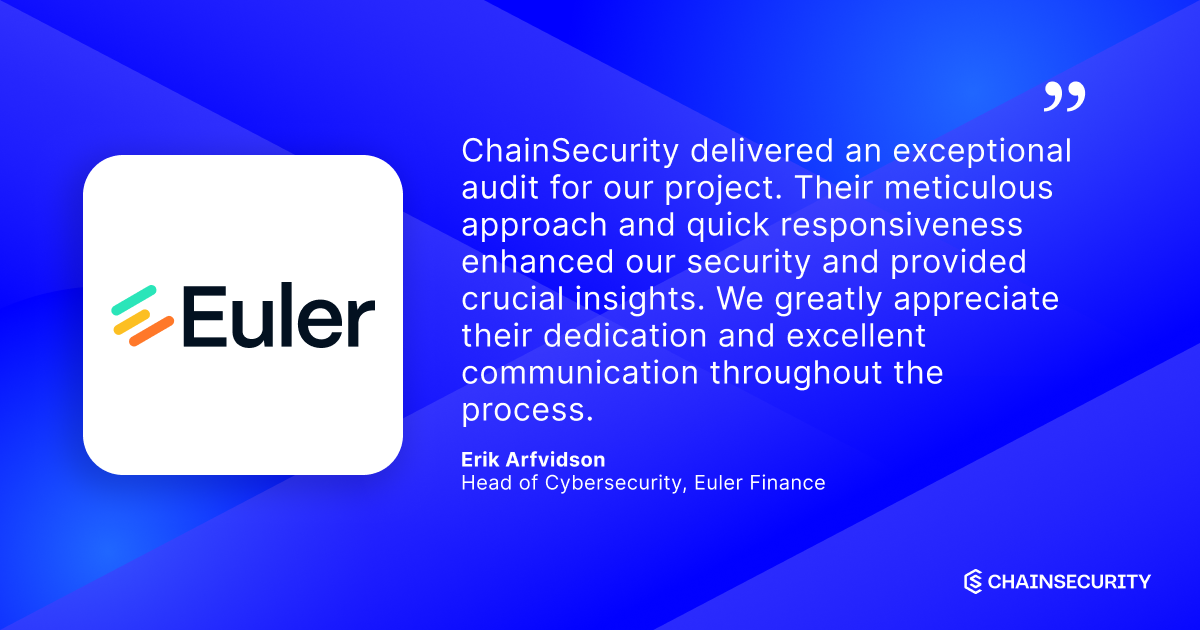

Summary
The most critical subjects covered in our audit are functional correctness, precision of arithmetic operations, and front-running. Security regarding all the aforementioned subjects is good but improvable, see Unaccounted roundings when depositing and withdrawing and Balance of Euler account counted twice in calcLimits(). Notice that Euler decided not to fix some of the issues for the time being; these issues have been marked Acknowledged .
The general subjects covered are code complexity, gas efficiency, and trust relationships. Security regarding all the aforementioned subjects is high.
In summary, we find that the codebase provides a good level of security, which could be improved if all the outstanding issues were to be addressed.
It is important to note that security audits are time-boxed and cannot uncover all vulnerabilities. They complement but don't replace other vital measures to secure a project.
About EulerSwap
Euler implements EulerSwap, an AMM that uses a custom bonding curve, and enhances its liquidity by borrowing additional funds from Euler vaults.


Summary
The most critical subjects covered in our audit are the correctness and potential regressions of the refactored code, the correctness of partial liquidations and the new Tumbler rate keeper. Security regarding all the aforementioned subjects is high.
The general subjects covered are gas efficiency, testing, documentation and specification. Security regarding all the aforementioned subjects is high.
In summary, we find that the codebase provides a high level of security.
It is important to note that security audits are time-boxed and cannot uncover all vulnerabilities. They complement but don't replace other vital measures to secure a project.
About Gearbox Core & Oracles V3.10
Gearbox implements V3.10 of the Core protocol and the oracles. The new version aims to make the system compatible with the new governance module. Moreover, it adds partial liquidations.
“Gearbox is a generalized leverage protocol: it allows anyone to take leverage in a DeFi-native way and then use it across various DeFi protocols. You take leverage with Gearbox and then use it on other protocols you already love. For example, you can leverage trade on Uniswap, leverage farm on Yearn or Curve and Convex, make complex delta-neutral strategies involving options and derivatives, get Leverage-as-a-Service for your structured product doing complex positions, etc.
The protocol has two sides to it: passive liquidity providers who earn higher APY by providing liquidity; – and active traders, farmers, or even other protocols who can borrow those assets to trade or farm with x4+ leverage.”


Summary
The most critical subjects covered in our audit are functional correctness, access control, and integration with the existing contracts. The general subjects covered are documentation, trustworthiness, and unit testing.
Security regarding all aforementioned subjects is high. However, it is improvable due to potential escalation of privileges as outlined in Bypassing step-size and DoSing ilk initializations.
In summary, we find that the codebase provides a good but improvable level of security.
It is important to note that security audits are time-boxed and cannot uncover all vulnerabilities. They complement but don't replace other vital measures to secure a project.
About Sky SP-BEAM Module
Sky implements SP-BEAM, a module enabling permissioned actors to make direct changes to stability and savings rates.
“The Sky Protocol (formely known as MakerDAO) is one of the largest dapps on the Ethereum blockchain. Designed by a disparate group of contributors, including developers within the MakerFoundation, its outside partners, and other persons and entities, it is the first decentralized finance (DeFi) application to see significant adoption.”

.svg)
Summary
The most critical subjects covered in our audit are signature handling, event handling, and access control. Security regarding all the aforementioned subjects is high.
The general subjects covered are functional correctness, upgradability, trustworthiness, and documentation. The core contracts in the scope of this review are upgradeable and fully controlled by an admin role. In addition, several accounts are required to be trusted, see Roles and Trust Model andPotential Single Points of Failure. The project has extensive documentation and inline code specification.
In summary, we find that the codebase provides a high level of security.
It is important to note that security audits are time-boxed and cannot uncover all vulnerabilities. They complement but don't replace other vital measures to secure a project.
About CCTP V2 Smart Contracts
Circle implements a new version of Cross-Chain Transfer Protocol (CCTP) that implements new features, such as fast burn messages and hook data. CCTP v2 uses new message formats that are incompatible with the previous version. Two versions of CCTP are treated as distinct networks in the smart contract level and use a different set of attesters.


Summary
The most critical subjects covered in our audit are functional correctness, front-running, and suitability for Sky's governance. The general subjects covered are trustworthiness and gas efficiency.
In summary, we find that the codebase provides a high level of security.
It is important to note that security audits are time-boxed and cannot uncover all vulnerabilities. They complement but don't replace other vital measures to secure a project.
About Sky Chief smart contracts
Sky implements a continuous approval voting system introducing SKY as the governance token while simplifying the previous version.
“The Sky Protocol (formely known as MakerDAO) is one of the largest dapps on the Ethereum blockchain. Designed by a disparate group of contributors, including developers within the MakerFoundation, its outside partners, and other persons and entities, it is the first decentralized finance (DeFi) application to see significant adoption.”
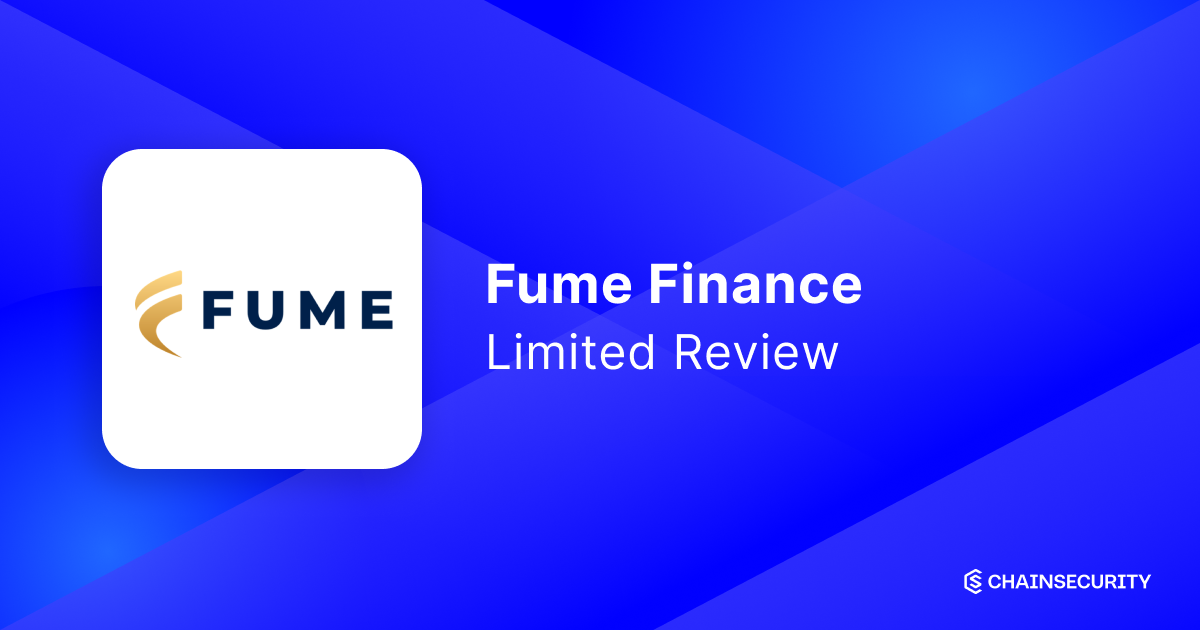

Summary
The most critical subjects covered in our audit are functional correctness, access control, precision of arithmetic operations.
Access control is working as expected.
Several issues with the correct handling of investment stages have been found in previous versions of this report. Furthermore, depending on the chosen base currency of a fund, the contracts were exposed to a certain degree of Precision loss. These problems have been mitigated.
In summary, we find that the codebase provides a good level of security.
It is important to note that security audits are time-boxed and cannot uncover all vulnerabilities. They complement but don't replace other vital measures to secure a project.
About Fume Finance smart contracts
Fume implements an on-chain administration platform for funds. Investments into such funds can be handled either off-chain or on-chain.
"Founded in 2023 and headquartered in Ticino, Switzerland, Fume was created to revolutionize the way investment funds are managed. The Fume platform is designed to support a wide range of assets, including digital tokens, stocks, real estate, and commodities, making it an attractive solution for both traditional and digital fund managers. Built by a team with deep expertise in blockchain, finance, and law, with the backing of a fintech VC, a family office, and established asset managers."
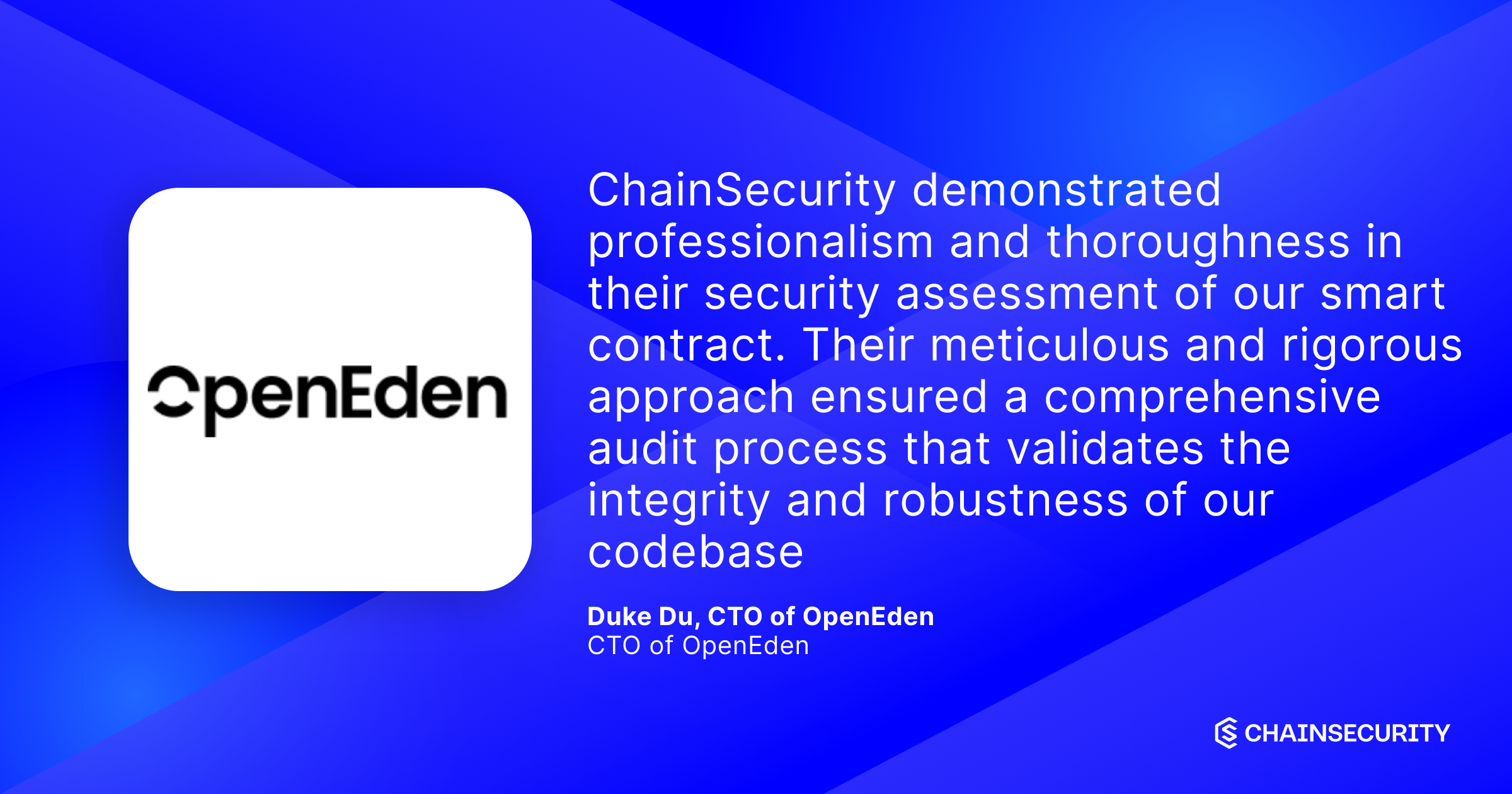

Summary
We did not find severe issues. However, multiple minor issues related to fees were raised (see Missing Slippage Protection, Fee Can Be Avoided on Small Amounts and Repeated Fees) and the deposit limits are ineffective as described in Ineffective First Deposit Limit. All issues where addressed.
In summary, we find that the codebase provides a high level of security. Yet, it is important to note that security audits are time-boxed and cannot uncover all vulnerabilities. They complement but don't replace other vital measures to secure a project.
About USDO & USDOExpress
OpenEden implements a USD stablecoin called USDO and a wrapper contract (acting as a vault) for it called cUSDO. The stablecoin will be backed by yield-earning U.S. treasury bills. USDOExpress adds instant mint and redeem functionality to the existing USDO token.


Summary
We did not find any critical issues in the codebase. Yet, we recommended testing cUSDO deposits, transfers and withdrawals with intermediate multiplier changes in USDO very carefully. All raised issues were addressed accordingly.
In summary, we find that the codebase provides a high level of security as most critical operations are access-controlled and should have additional off-chain procedures to ensure the security of the system. However, it is important to note that security audits are time-boxed and cannot uncover all vulnerabilities. They complement but don't replace other vital measures to secure a project.
About USDO
OpenEden implements a USD stablecoin called USDO and a wrapper contract (acting as a vault) for it called cUSDO. The stablecoin will be backed by yield-earning U.S. treasury bills.
.png)

Summary
The most critical subjects covered in our audit are functional correctness, access control and merkle proof verification. Security regarding all the aforementioned subjects is high.
The general subjects covered are gas efficiency and proper documentation. In summary, we find that the codebase provides a high level of security.
It is important to note that security audits are time-boxed and cannot uncover all vulnerabilities. They complement but don't replace other vital measures to secure a project.
About SparkRewards
Spark implements the SparkRewards smart contract to distribute ERC-20 tokens based on a Merkle tree root and epochs.
"Spark is on a mission to empower the DAI ecosystem. As part of the MakerDAO community, Spark builds and manages DeFi infrastructure."
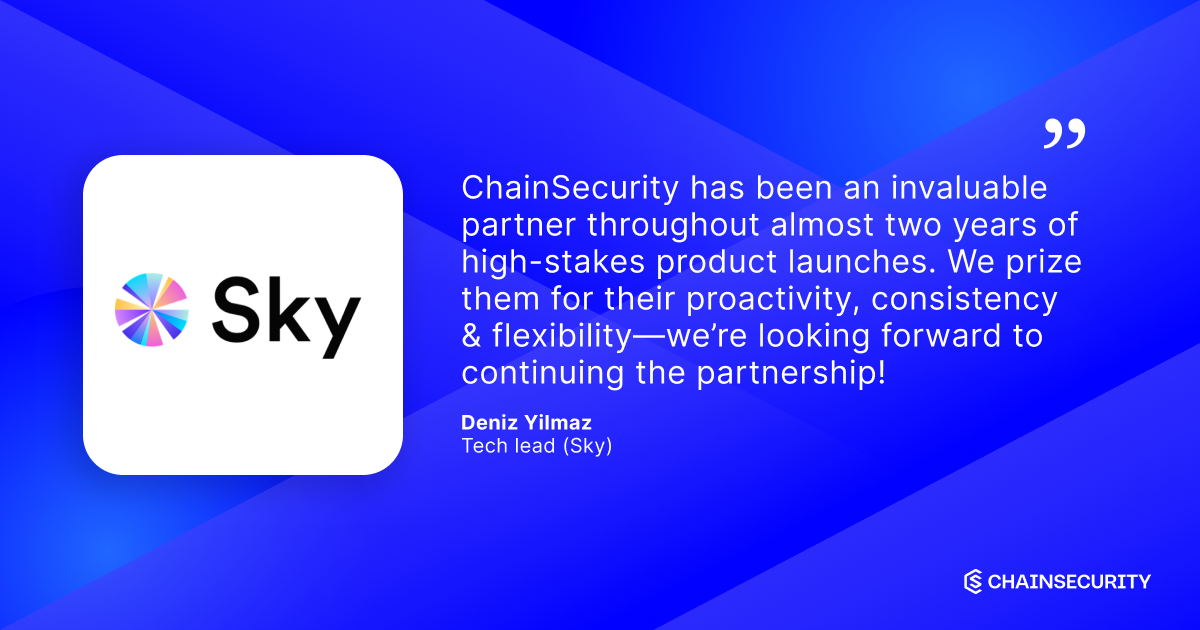

Summary
The most critical subject covered in our audit is functional correctness.
The general subjects covered are event handling, documentation, and gas efficiency.
Security regarding all the aforementioned subjects is high.
In summary, we find that the codebase provides a high level of security.
It is important to note that security audits are time-boxed and cannot uncover all vulnerabilities. They complement but don't replace other vital measures to secure a project.
About Sky DSS Blow2
Sky implements Dss Blow2, a contract to facilitate the returning of Dai and USDS to the Sky Protocol as system surplus.
“The Sky Protocol (formely known as MakerDAO) is one of the largest dapps on the Ethereum blockchain. Designed by a disparate group of contributors, including developers within the MakerFoundation, its outside partners, and other persons and entities, it is the first decentralized finance (DeFi) application to see significant adoption.”
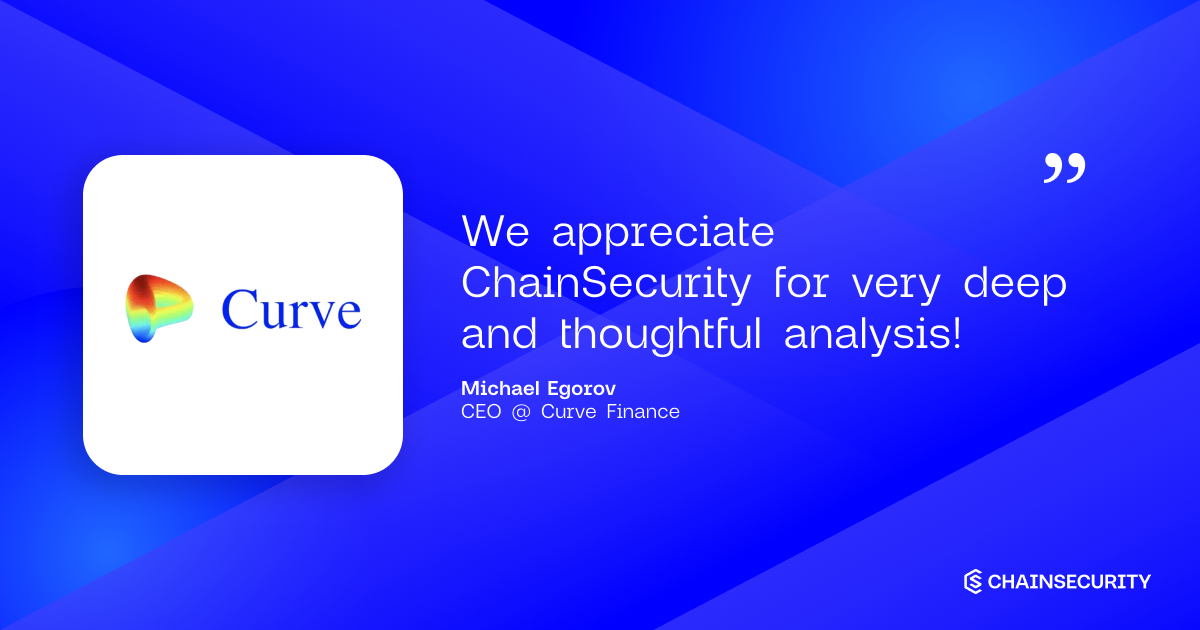

Summary
All high severity findings were resolved. Some new medium severity issues were identified in the latest review of the codebase. There are still many low severity issues open, and given a stable codebase and more time, likely many more could be found, due to the complexity of the codebase. However, assuming the more severe issues are addressed, they should be mostly benign.
In summary, we find that the codebase provides a good level of security.
The contracts are complex and have even more complex dependencies. We did not review the economic soundness of the contracts nor is it possible to find all the edge cases in this system.
It is important to note that security audits are time-boxed and cannot uncover all vulnerabilities. They complement but don’t replace other vital measures to secure a project.
About Curve Stablecoin
Curve implements a new stablecoin that is based on different mechanics to keep it stable and manage the loans.
—
“Curve is an exchange liquidity pool on Ethereum (like Uniswap) designed for (1) extremely efficient stablecoin trading (2) low risk, supplemental fee income for liquidity providers, without an opportunity cost.
Curve allows users (and smart contracts like 1inch, Paraswap, Totle and Dex.ag) to trade between DAI and USDC with a bespoke low slippage, low fee algorithm designed specifically for stablecoins and earn fees. Behind the scenes, the liquidity pool is also supplied to the Compound protocol or yearn.finance where it generates even more income for liquidity providers.”
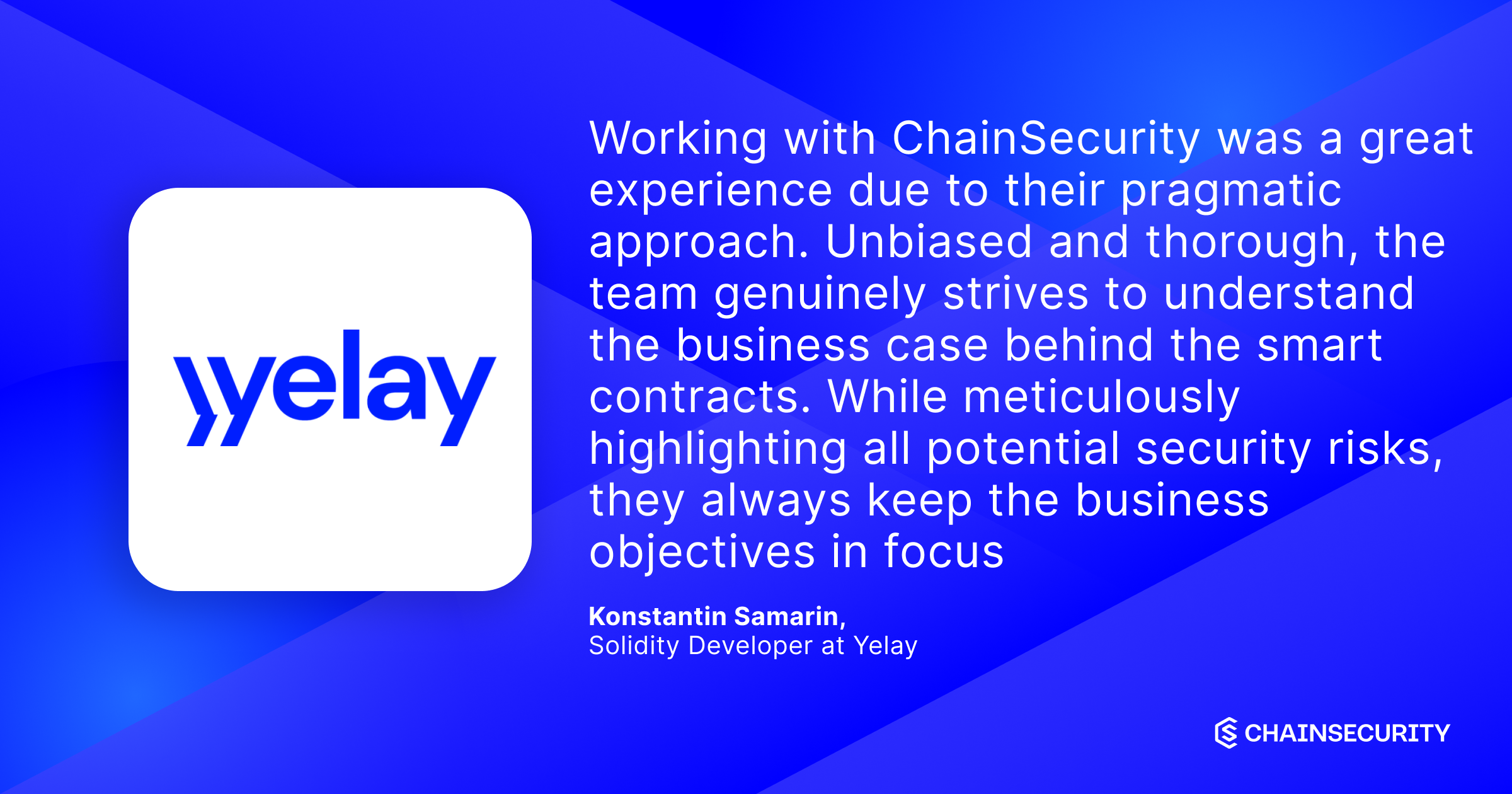

Summary
The code is well structured and implements an upgrade architecture similar to the diamond proxy upgrade pattern. The most critical subjects covered in our audit are functional correctness and arithmetic correctness. The most severe issues is an incorrectly calculated redeem (Incomplete fund transfer when withdrawing) and a double counted balance when swapping (double-counting in swap). All issues were addressed and resolved if necessary. We advised to increase the test suite as the issues could have been caught by e.g., testing redeems with strategies that partially fulfill the request.
The team was always very responsive and was clarifying all questions quickly and professionally. In summary, we find that the current codebase provides a good level of security.
It is important to note that security audits are time-boxed and cannot uncover all vulnerabilities. They complement but don't replace other vital measures to secure a project.
About Yelay Lite smart contracts
Yelay implements a dedicated vault system that directs all yield into a yield extractor. Users will be rewarded outside of the protocol from the respective clients. The vault is for approved projects only.


Summary
We could not identify any relevant issue in the code base. In summary, we find that the codebase provides a high level of security.
It is important to note that security audits are time-boxed and cannot uncover all vulnerabilities. They complement but don't replace other vital measures to secure a project.
About Sink Gauge v2
Velodrome implements a setup to lower the need of newly minted Velo which consequently slows down or could even stop the inflation rate. This is achieved by using a special gauge contract. If users vote for this gauge, the corresponding rewards will be sent directly from the voter to the minter contract. There is also a pool without functionality and the factory contracts to correctly integrate the setup in the overall ecosystem.
#Source
.png)
.png)
Summary
The most critical subjects covered in our audit are asset solvency and front-running resistance. Security regarding all the aforementioned subjects is high.
The general subjects covered are gas efficiency, code complexity, and documentation. The robustness regarding all the aforementioned subjects is satisfactory but can be improved, see Redundant checks in...Many() functions and Inaccurate NatSpec. Furthermore, this report contains notes highlighting considerations to prevent unexpected behavior during operation.
In summary, we find that the codebase provides a high level of security. No issues were identified that would pose a significant risk to the system.
It is important to note that security audits are time-boxed and cannot uncover all vulnerabilities. They complement but don't replace other vital measures to secure a project.
About Uniswap Franchiser Expiry
Uniswap Foundation's Franchiser system enables multi-level delegation of UNI tokens' voting power. This latest version introduces support for expirations with permissionless recall of funds to the original owner after expiry.
"The Uniswap Foundation is dedicated to building a self-sustaining community that contributes to the future growth of the Uniswap Protocol. We have strategically designed our grants program to create a long-lasting ecosystem made up of developers, researchers, and governance contributors. We strive to create shared ownership for our entire community and work with them to define the future of DeFi’s most important protocol."